- Engineering
Institute of Biomedical Engineering (BME)

Doctor of Philosophy (PhD)
The PhD in Biomedical Engineering is a research-intensive program that immerses students in the application of biomedical sciences and engineering principles to advance solutions for challenges in human health. Students can be admitted to the PhD program through direct entry after completion of a bachelor’s degree or, alternatively, after the completion of a master’s degree. PhD students receive a guaranteed minimum stipend for four years.
Length of study
Four years (defined as the period for an academically well-prepared student to complete all program requirements while registered full-time).
Admission requirements
- Entry into PhD program after completion of a bachelor’s degree (i.e., direct entry) : A four-year bachelor’s degree in engineering, medicine, dentistry, physical sciences, or biological sciences, or its equivalent , with an average of at least 3.7 on a 4.0 grade point average scale (i.e., A minus) in the final two years of study from a recognized university ; or
- Entry into PhD program after completion of a master’s degree : A master’s degree in engineering, medicine, dentistry, physical sciences, or biological sciences, or its equivalent , with a cumulative average of at least 3.3 on a 4.0 grade point average scale (i.e., B plus) from a recognized university .
- Proof of English-language proficiency is required for all applicants educated outside of Canada whose native language is not English. View the BME English-language requirement policy to determine whether you are required to take a language test and for a list of accepted testing agencies and their minimum scores required for admission.
- Applicants must find a BME faculty supervisor. ( NB : You do not need a supervisor at the time of application. However, admission is competitive and only candidates who have found and secured a research supervisor will be admitted to begin graduate studies.)
- MD/PhD candidates must apply through the MD program
- Possession of the minimum requirements for entry does not guarantee admission
- GRE score is not required
Application procedures
- Complete the online application (see requirements ) and pay the application fee
- Arrange for your English test score to be reported electronically to the University of Toronto by the testing agency if applicable. The institution code for U of T is 0982-00 (there is no need to specify a department)
- Contact the BME Graduate Office to identify your BME faculty supervisor
Rolling admission; multiple rounds with different enrollment capacity in each cycle
Tuition fees
Last updated: January, 2022
More information

What can I do with my degree? Read our alumni stories
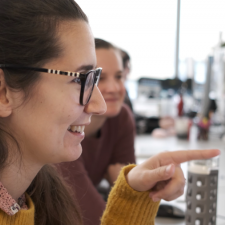
Life at BME, from BME students

Learn about different research labs
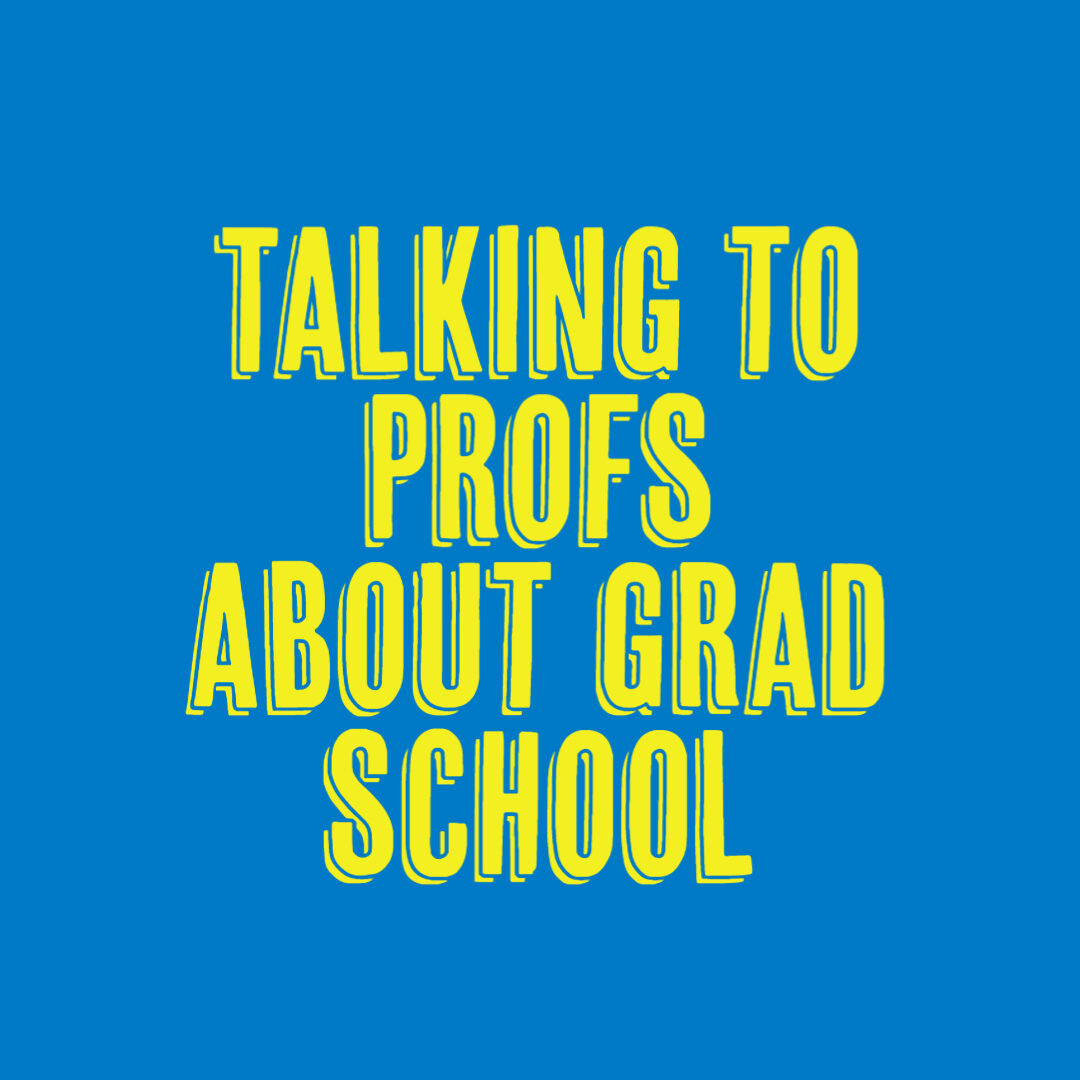
Don't know how to approach a faculty? Listen to our podcasts

Sign up for an information webinar

Network with faculty
© 2024 Faculty of Applied Science and Engineering
- U of T Home
- Accessibility
- Student Data Practices
- Website Feedback
- My UCalgary
- Class Schedule
- UCalgary Directory
- Continuing Education
- Active Living
- Academic Calendar
- UCalgary Maps
- Close Faculty Websites List Viewing: Faculty Websites
- Cumming School of Medicine
- Faculty of Arts
- Faculty of Graduate Studies
- Faculty of Kinesiology
- Faculty of Law
- Faculty of Nursing
- Faculty of Nursing (Qatar)
Faculty of Science
- Faculty of Social Work
- Faculty of Veterinary Medicine
- Haskayne School of Business
- School of Architecture, Planning and Landscape
- School of Public Policy
- Schulich School of Engineering
- Werklund School of Education
- Future Students
- Explore programs
- How to apply
- Understanding graduate studies
- Indigenous graduate students
- Financing grad school
- International students
- Graduate Student life
- Current Students
- Indigenous Graduate Students
- Newly Admitted
- Graduate Orientation
- Pre-arrival
- Registration
- Annual Registration
- Concurrent Registration
- Flexible Grading Option (CG Grade)
- Confirmation of registration
- Course registration
- Leave of absence
- Registration status
- Studying at another university
- Updating personal information (included preferred name)
- Thesis-based students
Fees and funding
- Understanding your fees
- Paying your fees
- Funding options
- Payment plan
- Supervision
- Best practices and guidelines
- Conflict of interest
- Changing supervision
- Academic integrity
- Annual progress report
- Intellectual property
- Building a thesis
- Submit your thesis
- Conducting oral exams remotely
- Thesis defence
- Course-based Students
- Academic Integrity
- Sources of funding
- Payment Plan
- NEW: Term-Based Registration
- Completing my degree
- Important dates and resources
- Forms and documents
- Service Requests and eForms
- News, updates and events
- Find your Graduate Program Administrator
- Calendar Archives
- Award Opportunities
- Graduate Awards Database
- Award opportunities
- Doctoral Recruitment Scholarships
- Award Guide
- Step 1: Applying
- Looking for awards
- Eligibility
- Preparing your application
- Step 2: Receiving
- Accept/Decline your award
- Getting paid
- Step 3: Managing your award
- Renewing your award
- Award interruption
- Award Termination
- Policies and Regulations
- Regulations
- Contact the Scholarship Office
- My GradSkills
- Academic Success
- My GradSkills Partners
- Communication Skills
- Research Communications Feedback Sessions
- Oral communication
- Visual communication
- Written communication
- Experiential Learning
- Internships
- For employers
- For graduate students
- Finding an internship
- Making your internship a TTI
- Applying for a TTI
- For graduate supervisors
- Images of Research
- Three Minute Thesis
- 2024 UCalgary 3MT Finalists
- 2024 3MT Finals' Hosts and Judges
- Past Three Minute Thesis Videos
- Workshops and Resources
- Career planning and professional development resources
- My GradSkills Calendar
- My GradSkills Workshop Matrix
- Online/Virtual Training
- UCalgary Alumni Mentorship Program
- Exceptional scholars
- What I wish I knew
- FGS Services
- Supervisory Renewal
- Supports for graduate students
- Graduate Academic and International Specialists
- Graduate supervisors
- Thesis and candidacy exams
- Supervisor resources
- Maintaining your supervisor profile
- Supervisory privileges
- Leadership team
- FGS Council
- Committees of Council
- Minutes and meetings
- Website Feedback
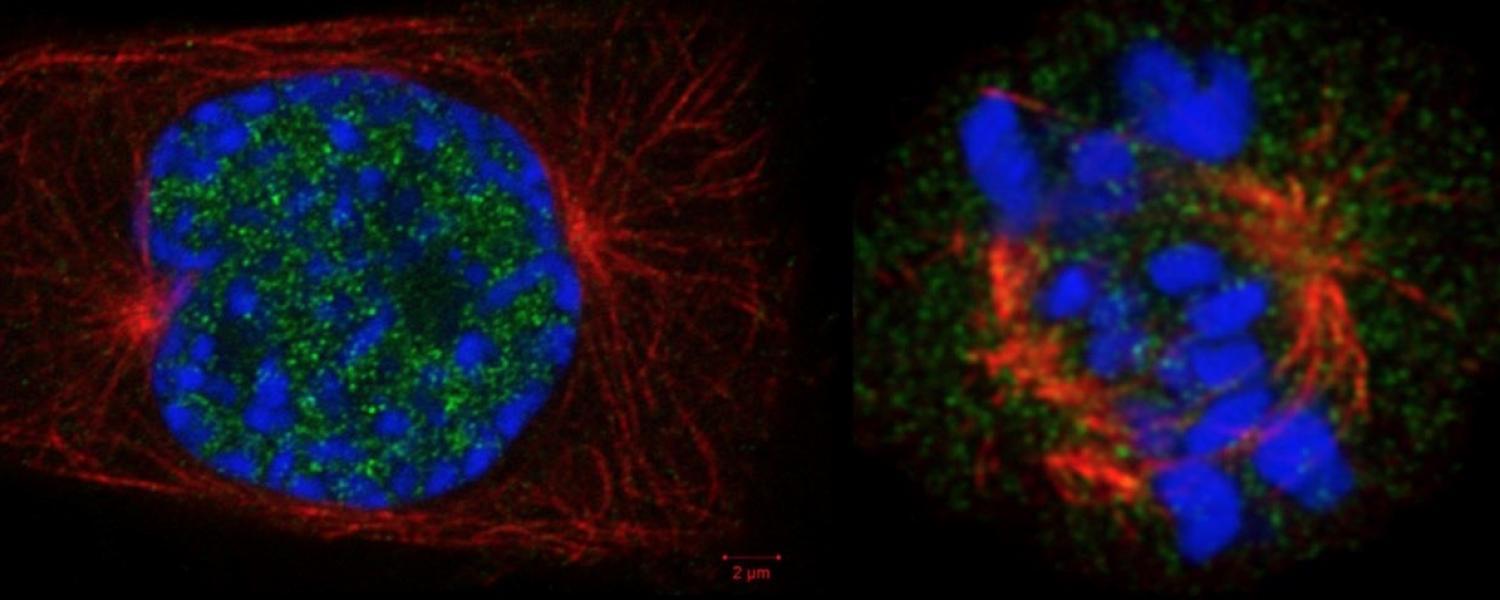
Biological Sciences
Thesis-based program, program overview.
Graduate study in Biological Sciences puts students on the front lines of discovery. Doctoral students design, conduct and analyze original research; they develop rigorous expertise in everything from foundational theory and the study of evolution to cutting-edge research methodologies as they investigate a broad range of biological problems ranging from the molecular level to the biosphere. Degrees are offered in four integrated areas: biochemistry; ecology and evolutionary biology; integrative cell biology; and microbiology. The program takes four to five years, with funding available through sources such as scholarships, teaching assistantships, research assistantships, and supervisor's research grants.
Completing this program
Research Seminar: Related to supervisor interest, and may include biochemistry, cell biology, ecology and evolutionary biology or microbiology.
Candidacy: Students will prepare a research proposal or essay, followed by an oral exam in their field of research expertise.
Additional Courses: Topics may cover biology of laboratory animals, theory and lab methods, statistical methods, recent advances and Darwin.
Thesis: Students will propose, write and successfully defend a research thesis.
Specializations
- Biochemistry
- Biophysical Chemistry
- Cell Biology
- Developmental Biology
- Environmental Biology
- Evolutionary Biology
- Molecular Microbiology
- Structural Biology
- Host-Pathogen Interactions
- Energy and Environmental Systems
Professor, biologist, teacher, consultant, scientist (agricultural/forestry breeding, process development, environmental), data analyst, biotechnologist, genetic counsellor, manager (lab, project, clinic, territory, resource), science writer, research technician, bioscience/biotechnology business.
A PhD in biological sciences is usually considered a final degree.
Students are required to prepare a thesis and successfully defend in an open oral defense.
Minimum of two courses, with additional seminar courses
Learn more about program requirements in the Academic Calendar
Classroom delivery
Time commitment.
Four years full-time; six years maximum
A supervisor is required, and must agree to oversee the student's research before admission will be granted
See the Graduate Calendar for information on fees and fee regulations, and for information on awards and financial assistance .
Virtual Tour
Explore the University of Calgary (UCalgary) from anywhere. Experience all that UCalgary has to offer for your graduate student journey without physically being on campus. Discover the buildings, student services and available programs all from your preferred device.
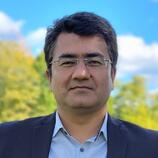
Arshad Ayyaz

Robert Barclay
John EA Bertram

Tamara Bodnar
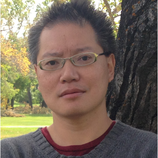
Gordon Chua
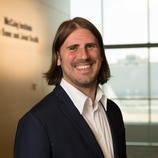
Antoine Dufour
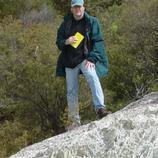
Peter Dunfield
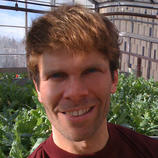
Peter Facchini
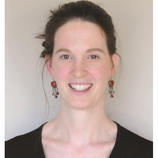
Constance Finney
Admission requirements
A minimum of 3.2 GPA on a 4.0 point system, over the past two years of full-time study (a minimum of 10 full-course equivalents or 60 units) of the undergraduate degree.
Minimum education
Completion of a Master of Science program recognized by the Faculty of Graduate Studies. Exceptional students may apply to a PhD program without a Master of Science recognized by the Faculty of Graduate Studies.
Work samples
A concise statement outlining the applicant's research interests and reasons for wishing to attend the University of Calgary
Reference letters
Three academic reference letters along with the required reference form.
Test scores
English language proficiency.
An applicant whose primary language is not English may fulfill the English language proficiency requirement in one of the following ways:
- Test of English as a Foreign Language (TOEFL ibt) score of 105.
- International English Language Testing System (IELTS) score of 7.5 (minimum of 6.0 in each section)
- Pearson Test of English (PTE) score of 75, or higher (Academic version).
- Canadian Academic English Language test (CAEL) score of 70 (minimum 70 in each section)
- Academic Communication Certificate (ACC) score of A- in each course.
- Cambridge C1 Advanced or Cambridge C2 Proficiency minimum score of 200.
- Duolingo English Test and obtaining a minimum score of 145* (with no sub-score below 125*).
For admission on September 1
- Canadian and permanent resident (students with Canadian or U.S. transcripts)- apply by June 1
- International (students with international transcripts)- apply by May 1
For admission on January 1
- Canadian and permanent resident (students with Canadian or U.S. transcripts)- apply by Oct. 1
- International (students with international transcripts)- apply by Sept. 1
For admission on May 1
- Canadian and permanent resident (students with Canadian or U.S. transcripts)- apply by March 1
- International (students with international transcripts)- apply by Jan. 1
If you're not a Canadian or permanent resident, or if you have international credentials, make sure to learn about international requirements
Have you made your final decision and you’re ready to apply?
Learn more about this program, department of biological sciences.
Biological Sciences Building 186 2500 University Drive NW Calgary, ABT2N 1N4 403-220-6623
Contact the Graduate Program Administrator
Visit the departmental website
University of Calgary 2500 University Drive NW Calgary, AB, T2N 1N4
Visit the Faculty of Science website
Related programs
If you're interested in this program, you might want to explore other UCalgary programs.
Thesis-based MSc
Anthropology
Thesis-based MA
Thesis-based PhD
Archaeology
Biochemistry and molecular biology, medical science, microbiology and infectious disease, veterinary medicine, curious about the university of calgary.
Located in the nation's most enterprising city, we are a living, growing and youthful institution that embraces change and opportunity with a can-do attitude.
Graduate Studies
Biochemistry and biomedical sciences.
The biological and chemical processes that occur within living organisms in health and disease, and the application of the principles of the natural sciences to medicine.
Faculty of Health Sciences
Program Contact
Degree Options
Biochemistry and biomedical sciences (msc).
A research-intensive program embracing a variety of diverse scientific areas of biochemistry including stem cells and cancer research, cell and human biology, microbiology and infectious diseases, and structural biology.
Areas of Research
- Microbiology, immunology and drug discovery
- Metabolism, cell biology and genomics
- Stem cells and cancer biology
Biochemistry and Biomedical Sciences (PhD)
Biochemistry and biomedical sciences (md/phd), alyssa vito scholarship in cancer research $.
Established in 2022 by Dr. Alyssa Vito, survivor of triple negative breast cancer and MSc/PhD McMaster alumna. To be awarded by the School of Graduate Studies, on the recommendation of the Graduate Associate Dean, Faculty of Health Sciences, to a graduate student who conducts cancer research with a component of their activities devoted to leadership, community outreach, and patient engagement. Preference will be given to students pursuing research in breast cancer.
Association of Canadian Universities for Northern Studies (ACUNS) Varied values
Varied values
ACUNS established its scholarship program, the Canadian Northern Studies Trust (CNST) in 1982 to advance knowledge and understanding of Canada’s North. The purpose of the CNST is to develop a cadre of scholars and scientists with northern experience and, at the same time, to enhance the educational opportunities available for northern residents.
For a list of scholarships and funding available, as well as eligibility criteria, award values, application details, and deadlines, visit the ACUNS website.
Autism Scholars Award $$$
Deadline Date:
December 1, 2023
With the support of the Ministry of Training, Colleges, and Universities, a scholar awards program in autism has been established to ensure that Ontario attracts and retains pre-eminent scholars. The community of autism scholars fostered by this awards program will excel, according to internationally accepted standards of scientific excellence, in the creation of new knowledge concerning child autism, and its translation into improved health for children, more effective services and products for children with autism, and increase the province’s capacity in diagnosis and assessment of autism and a strengthened treatment system.
One one-year award at the master’s level and up to two one-year awards at the doctoral level will be made by the COU:
- Master’s Award: $18,000 ($6,000 per term beginning September 2024)
- Doctoral Award: $20,000 ($6,666 per term beginning September 2024)
Canada Graduate Scholarships – Michael Smith Foreign Study Supplements $$
May 22, 2024
The CGS-MSFSS supports high-calibre Canadian graduate students in building global linkages and international networks through the pursuit of exceptional research experiences abroad. By accessing international scientific research and training, CGS-MSFSS recipients will contribute to strengthening the potential for collaboration between Canadian and foreign institutions.
Please review eligibility and criteria for more information about this travel award.
If you wish to apply, please contact your department graduate administrator.
Canada-U.S. Fulbright Program
The bi-national program is an educational exchange, with a mandate to enhance mutual understanding between the people of Canada and the people of the United States of America. Available to graduate students, faculty, professionals and independent researchers, successful applicants conduct research, lecture, or enroll in formal academic programs in the United States. Fulbright Canada offers various scholarship awards within this program, with further information on the various award opportunities made available through the Canada-US Fulbright Program website.
For eligibility criteria, award values, application details and deadlines, visit the Fulbright website.
CIBC Graduate Bursaries in Breast Cancer $$
The CIBC Graduate Bursaries in Breast Cancer was established in 2004 by CIBC under the McMaster Student Opportunity Fund II initiative in support of CIBC’s belief that all students should have the opportunity to pursue their educational goals. To be granted first to students enrolled in a graduate program in the Faculty of Health Sciences who demonstrate financial need and are conducting thesis research in the field of breast cancer and alternatively to students who are conducting thesis research in the field of women’s health, obstetrics, gynecology or medical oncology. Preference will be given to full-time graduate students who have demonstrated academic excellence.
CIHR Canada Graduate Scholarship – Doctoral $$$$
October 2, 2023
McMaster internal ResearchNet deadline: October 2, 2023, 11:59 p.m.
Applications are prepared and submitted by students in ResearchNet by the internal deadline set by McMaster. You will not be able to submit your application to ResearchNet until all the required tasks are completed, including the letters from your sponsors.
We encourage you to work closely with your supervisor and department on your application. The application you submit to ResearchNet on October 2 will be the final version that will be sent to CIHR if approved by McMaster.
CIHR Postdoctoral Fellowship $$$$
September 27, 2023
Postdoctoral research opportunities funded through CIHR. E-Approval done through the Office of Postdoctoral Affairs.
Fellowships provide support for highly qualified applicants in all areas of health research at the post-PhD degree or post-health professional degree stages to add to their experience by engaging in health research either in Canada or abroad.
Up to $60,000 per annum for up to five years.
Eligibility
At the time of application, the Nominated Principal Applicant must be/have:
- a trainee, with an identified primary supervisor,
- commit 75% of your time in the research fellowship role to the proposal,
- hold or be completing a PhD degree or a regulated health professional degree by the last possible date to take up the fellowship.
General application process
Information and instructions for this year’s competition are available on SharePoint.
Applications are prepared and submitted by individuals on ResearchNet by the internal deadline set by McMaster . Please see the ResearchNet website for information on eligibility requirements, guidelines, how to apply, and information regarding the review process and evaluation.
McMaster Internal RESEARCHNET deadline: 12 p.m. EST, Wednesday, September 27, 2023
Review and Submission
Please note that applications will be returned to applicants for correction or review and final approval before they are submitted to CIHR. It is the applicant’s responsibility to resubmit their application after the internal deadline and before the McMaster final deadline for submission.
It is important to note that it is the applicant’s sole responsibility to follow up with his/her sponsors to ensure that the assessments are submitted online by their sponsors no later than 12 p.m., Monday, September 25, 2023.
McMaster Internal Final Deadline for Submission: 12 p.m., Wednesday, October 4, 2023
- CIHR deadline: October 5, 2023
- Anticipated notice of decision: April 30, 2023
- Funding start date: April 1, 2024
For questions on CIHR funding guidelines, how to apply, contact:
- Email: [email protected]
- Telephone: 613-954-1968
- Toll-Free: 1-888-603-4178
For ResearchNet technical support contact:
- Email: [email protected]
- Telephone: 613-941-9080
This competition is being managed by the Office of Postdoctoral Affairs in the School of Graduate Studies. Applicants are encouraged to contact Catherine Maybrey, coordinator of postdoctoral affairs and research training, at [email protected] for questions regarding deadlines and submissions.
Clarification of Signature Pages
- Only supervisor(s) signatures are required. Printed names should always accompany signatures.
- No institution signatures are required on the pages at the time of application, as McMaster University’s submission on your behalf acts as the institution/institution paid signature.
Scan and upload the signed signature pages, including the routing slip, as one PDF (unprotected and not exceeding 30 MB), in the Print/Upload Signature Pages task in ResearchNet prior to submitting the application
CIHR Strategic Master’s Award $$$
December 14, 2023
The CIHR Strategic Master’s Award program provides financial support to scholars who are engaged in an eligible master’s program in Canada (refer to Eligibility) and that are relevant to specific CIHR priority research areas. This support allows these scholars to concentrate on their studies in their chosen fields.
The CIHR Strategic Master’s Award program is supported by CIHR Institutes and Initiatives with specific priority areas and is administered by CIHR.
CIHR, NSERC and SSHRC Canada Graduate Scholarships – Master’s (CGS-M) $$$
The CGS M Awards Program supports students in all research disciplines and is administered jointly by Canada’s three federal granting agencies: the Canadian Institutes for Health Research (CIHR), the Natural Sciences and Engineering Research Council of Canada (NSERC), and the Social Sciences and Humanities Research Council of Canada (SSHRC). The selection process and post-award administration are carried out at the university level, under the guidance of the three agencies.
For a recorded information session about the Fall 2023 application process, click on the Learn More button.
CSA Group Graduate Scholarship $$
March 31, 2024
The purpose of the CSA Group Graduate Scholarship is to support graduate students in the pursuit of knowledge generation related to standards. Full-time graduate students at the Masters level studying at a publicly funded, accredited Canadian university are eligible to apply.
The research can be conducted in any field (e.g. engineering, social sciences, health sciences) and must include standards as a component of the research. The topic does not need to be related to an area in which CSA Group already has standards. The research may investigate aspects of an existing standard or may explore an area for future standards development.
Dr. J. A. Campbell Young Investigator Award $$
April 30, 2023
The Dr. J. A. Campbell Young Investigator Award of $5,000 for any kind of research into celiac disease and / or gluten sensitivity is available to students and those who have recently completed degrees.
Eligibility criteria, application details and deadlines available on the Canadian Celiac Association website.
Dr. John Thomas Memorial Bursary $
Dr. John Thomas Memorial Bursary was established in 1996 in memory of Dr. John Thomas by family, friends and colleagues. The bursary fund will assist graduate students enrolled in the department of philosophy or the Faculty of Health Sciences who demonstrate financial need. To be awarded by the School of Graduate Studies with preference given to students studying medical or applied ethics.
E.B. Eastburn Fellowship $$$$
March 3, 2025
Under the terms of a bequest to Hamilton Community Foundation by the late Eugene B. Eastburn, a two-year Fellowship will be awarded for full-time postdoctoral studies in engineering or sciences (Natural or Physical sciences, including Health Sciences).
The fellowship will be awarded for 24 months for a total value of $90,000.
Note: The 2025 competition will be announced in late fall 2024.
Fulbright canada student awards $ – $$$.
November 15, 2023
Traditional Fulbright Canada Student awards are intended for Canadian citizens who are graduate students, prospective graduate students, or promising young professionals who wish to study and/or conduct research in the United States. Awards may be held at any university, research centre, think tank, or government agency in the United States.
For eligibility criteria, award values, application details and deadlines, visit the Fulbright Canada website.
GSA Travel Award $
The GSA Travel Assistance Grants are funded from the proceeds of the Graduate Students Association Development Fund, which receives contributions from graduate students and the University. The GSA Travel Assistance Grants fund is administered through the School of Graduate Studies. The GSA Travel Assistance Grants are designed to enable graduate students to travel to undertake research or present at conferences relevant to their field of study. There are a fluctuating number of awards available each semester.
The successful recipients will be determined randomly by selecting one recipient from each faculty (Health Sciences, Engineering, Science, Humanities, Social Sciences, and Business) and the balance of the awards left in a given period will be randomly selected from a list of the remaining applicants from all faculties combined.
Application dates:
- Fall competition for September to December travel: Opens September 1, 2023 and closes October 2, 2023
- Winter competition for January to April travel: Opens January 2, 2024 and closes February 5, 2024
- Summer competition for May to August travel: Opens May 1, 2024 and closes June 3, 2024
H.G. Hilton Master’s Scholarship $$
The H.G. Hilton Master’s Scholarships were established by the income from a bequest in the estate of Hugh G. Hilton, at one time Chief Executive Officer of Stelco and member of the McMaster Board of Governors support a Master’s scholarship. The scholarship is tenable for one year, and is awarded annually to incoming Canadian citizens, permanent residents or, international students from departments which offer full-time Master’s graduate studies. Priority will be given to students intending research in Canadian industry or industrial problems. Other things being equal, preference will be given to deserving children of employees or former employees of Stelco Ltd.
Harvey E. Longboat Graduate Scholarship $$-$$$
March 14, 2024
The Harvey E. Longboat Graduate Scholarship for First Nation, Inuit, and Métis Students was established in 2009 in honour of Harvey E. Longboat, and in recognition of his extraordinary contributions to McMaster University and to the broader community. The School of Graduate Studies, in consultation with the Indigenous Studies program and the Indigenous Education Council, will award the scholarship annually to a First Nation, Inuit, or Métis student(s) who has demonstrated high academic achievement and exceptional promise.
The scholarship is tenable for one year, although previous award winners may re-apply.
Incoming students are eligible to apply.
Health Research Postdoctoral Opportunities
A comprehensive list of funding sources and agencies for postdoctoral fellows in the Faculty of Health Sciences and those doing health-related research can be found in McMaster’s funding database.. On the site, you will find a variety of filters to help you in your search.
Health Sciences Graduate Scholarship for Indigenous Scholars $$
All incoming Indigenous graduate students who are studying in a graduate program located within the Faculty of Health Sciences, are eligible to apply for this award.
Applicants who are completing a FIAP application for a facilitated graduate program, will be automatically considered for this award.
For full eligibility criteria, application details and deadlines, visit the Faculty of Health Sciences website. (Link below.)
Hugh C. Morris Experiential Learning Fellowship $$$$
The Hugh C. Morris Experiential Learning Fellowship, valued at $40,000 Cdn, is open to any graduate student studying in Canada who is working in a field related to
- earth, geosciences
- environment
- alternative energy
- climate change
- sustainability
or the social impact, social sciences or design sciences related to these areas, and is designed to provide a unique experiential, international travel program designed by the student to engage diverse sectors, advance their research, learn from a range of contexts and cultures, and bring their learning back to Canada.
Review deadlines and all associated information on the Kimberley Foundation website.
Iranian Student Memorial Scholarship $
Established in honour of McMaster Faculty of Engineering PhD students Iman Aghabali and Mehdi Eshaghian, and a former Faculty of Health Science Post-Doctoral Fellow, who lost their lives on the downing of Ukrainian International Airlines Flight PS752. To be awarded by the School of Graduate Studies, on the recommendation of the Associate Deans responsible for graduate studies, to international graduate students from Iran who demonstrate academic excellence.
John Charles Polanyi Prize $$$
In honour of the achievement of John Charles Polanyi, recipient of the 1986 Nobel Prize in Chemistry, the Government of the Province of Ontario has established a fund to provide annually up to five prizes to outstanding researchers in the early stages of their career who are continuing to postdoctoral studies or have recently started a faculty appointment at an Ontario university.
Lee Crohn’s Disease Graduate Scholarship $
Established in 2022 by Joseph and Joanne Lee. To be awarded by the School of Graduate Studies, on the recommendation of the Faculty of Health Sciences, to a graduate student who demonstrates academic or research excellence in the field of Crohn’s disease.
Lee Origins Institute Graduate Scholarship $
Established in 2022 by Joseph and Joanne Lee. To be awarded by the School of Graduate Studies, on the recommendation of the Faculty of Science, to a graduate student who demonstrates academic or research excellence within the Origin’s Institute.
Lyle Makosky Values and Ethics in Sport Fund $
April 30, 2024
This award is through the True Sport Foundation of Canada. Open to applicants who are
- high-performance athletes enrolled at a Canadian university, community college or other post-secondary educational institution.
- post-secondary students active in sport at a non-high-performance level.
- sport practitioners active/working in sport as an official, administrator or high-performance coach.
- educators working in a sport, sports sciences, sport management/administration or other applicable discipline.
All questions should be directed to the True Sport Foundation of Canada.
Visit their website for all details and contact information.
MacDATA Graduate Fellowship $$
March 15, 2021
The advent of large collection of data and ensuing development in data analysis techniques has made collaboration between data scientists and content experts necessary for cutting-edge research. Furthermore, there is a need for trainees to be exposed to both aspects of such research, namely for data science trainees to learn about real life practical projects and for content expert trainees to gain experience in data analysis and management. The aims of the MacDATA Graduate Fellowship Program are:
- To provide trainees with an opportunity to acquire practical and theoretical skills in data science.
- To facilitate exchange of expertise and knowledge in data science across faculties.
Mackenzie King Memorial Scholarships $$-$$$
February 1, 2024
The Mackenzie King Scholarships were set up under the will of the Rt. Hon. W.L. Mackenzie King (1874-1950), who was Prime Minister of Canada 1921-26, 1926-30, and 1935-48.
Two types of the Mackenzie King Scholarship are available to graduates of Canadian universities: the Open Scholarship and the Travelling Scholarship . Both are to support graduate study.
Manulife Life Lessons Scholarship Program $$
March 31, 2023
Manulife has introduced the first Life Lessons Scholarship Program in Canada, for students who’ve experienced the death of a parent or guardian with little to no life insurance. The Scholarship Program helps combat the financial burden of paying for post-secondary education during an emotional time and recognizes the perseverance that so many youth show in such adversity.
The next application call for this scholarship opens on February 1, 2024. Visit the Manulife website for details on that date.
Maple Leaf Centre for Food Security $$$
February 23, 2024
Four scholarships open to master’s and PhD students who are conducting research on determinants, impacts, and policy or program interventions into food insecurity in Canada.
Visit Maple Leaf Centre for Food Insecurity to learn more and apply.
Questions can be directed to [email protected] .
Marie Sklodowska-Curie Fellowship Programme $$$$
The Marie Sklodowska-Curie Fellowship Programme (MSCFP) aims to help increase the number of women in the nuclear field, supporting an inclusive workforce of both men and women who contribute to and drive global scientific and technological innovation.
Fields of study
The program supports young women studying in nuclear related fields relevant to the International Atomic Energy Agency’s work to advance the safe, secure and peaceful uses of nuclear science and technology such as nuclear engineering, nuclear physics and chemistry, nuclear medicine, isotopic techniques, radiation biology, nuclear safety, nuclear security, non-proliferation and nuclear law.
Visit the IAEA website for all details about this award, as well as additional examples of fields of study.
McMaster Graduate General Bursary $
What is a bursary.
A bursary is based solely on financial need. In most cases, information from your OSAP application is used to determine your financial need (some students who don’t receive OSAP can still apply for a bursary).
The McMaster Graduate General Bursary Program application opens mid-August in AwardSpring. Funding is paid out in mid-February.
Who can apply?
Graduate students who demonstrate financial need can apply for the McMaster Graduate General Bursary Program.
Please note: The McMaster Graduate General Bursary Program is not open to international students enrolled in graduate studies, MBA, medicine or physician assistant programs.
Bursary eligibility requirements:
- Be enrolled at McMaster
- Submit a completed application by the bursary deadline
- OSAP students who receive an income update request must complete it by the income update deadline
- Continue to demonstrate financial need throughout the study period
- Indigenous students
- students with OSAP government aid restrictions include:
- academic progress restriction
- income verification restriction
- provincial and/or federal default restriction
- credit check restriction
- students with a disability taking a reduced course load
- students with out-of-province student aid
- part-time students
- students receiving social assistance
McMaster Institute for Research on Aging (MIRA) Postdoctoral Fellowship $$$$
July 15, 2020
Prospective postdoctoral fellows are invited to submit a research plan that focuses on interdisciplinary, impact-driven approaches in the study of optimal aging through one or more of the following research areas:
- the impact of exercise on mobility;
- the interrelationship between psychological function and social function;
- causes and consequences of multimorbidity, frailty, and polypharmacy;
- the role of caregiving, equity, economics and transportation in optimal aging;
- the understanding of the biological mechanisms of diseases of aging;
- evaluating approaches to knowledge translation to improve optimal aging; and
- the use of technology to promote optimal aging and aging in place.
The applicant and principal supervisor are expected to involve at least two other researchers from two different McMaster faculties (outside of the principal supervisor’s faculty) as mentors in the development of an interdisciplinary research plan.
Michael G. DeGroote Fellowship Awards $$$$
November 1, 2019
The DeGroote Fellowship Awards are offered in TWO categories:
- The Michael G. DeGroote Fellowship Award in Basic Biomedical Science. Candidates conducting basic science research will be eligible for the Basic Biomedical Science Fellowship Award
- The Michael G. DeGroote Fellowship Award in Clinical Research. Candidates pursuing clinical research will be eligible for the Clinical Research Fellowship Award.
For eligibility criteria, award values, application details and deadlines, visit the DeGroote Fellowship Awards web page.
Michael Kiley Graduate Scholarship in Antibiotic Resistance $
Established in 2017 by the family of Michael Kiley. To be awarded to a graduate student associated with the Michael G. DeGroote Institute for Infectious Disease Research who has made a significant contribution to antibiotic infection research through a presentation of their research at an annual trainee research symposium. To be awarded annually by the School of Graduate Studies on the recommendation of the executive committee of the Michael G. DeGroote Institute for Infectious Disease Research.
Mildred Gulliver Graduate Scholarship in Infectious Diseases $
The Mildred Gulliver Graduate Scholarship in Infectious Diseases was established in 2009 by the estate of Mildred Kathleen Hodgson Gulliver. To be award to a graduate student connected to the Michael G. DeGroote Institute for Infectious Disease Research who has made a significant contribution to anti-infection research through a presentation of their research. Winners will present at an annual trainee research symposium. The scholarship is non-renewable, and awarded by the School of Graduate Studies on the recommendation of the Executive Committee of the Michael G. DeGroote Institute for Infectious Disease Research.
MIRA and Labarge Scholarships in Aging Research $$$
February 28, 2002
The MIRA and Labarge Scholarship program offers awards at the master’s and PhD level in two distinct streams. The Labarge Mobility Scholarship supports applicants whose research on aging includes a focus on mobility. The MIRA Scholarship in Aging Research supports interdisciplinary aging research in one of MIRA’s identified areas of focus.
The scholarships are open to master’s students beginning a new McMaster graduate degree in the 2022/2023 school year and PhD students entering year one or two of their studies. Interested candidates must develop and submit a research proposal in collaboration with a MIRA supervisor and an interdisciplinary mentor from outside the primary supervisor’s Faculty. MIRA requires confirmation that the supervisor and/or program will commit to matching the minimum level of support for the recipient for the duration of the graduate degree. See call for proposals and application form for more information.
MIRA Graduate Student Travel Awards $
March 15, 2020
The McMaster Institute for Research on Aging funds up to 10 graduate student travel awards per year – five in each round – valued at $500 each for students working with MIRA researchers. Graduate students travelling to an academic conference to present an accepted abstract in aging research are eligible for up to $500 in travel funding.
For details about this and other funding opportunities, visit MIRA .
Deadlines for 2020: March 15 and September 15
MURA Academic Scholarship
Established in 2020 the McMaster University Retirees Association (MURA). To be awarded by the School of Graduate Studies to a graduate student researching technological advances related to seniors, and who demonstrates academic excellence.
NSERC Doctoral scholarships $$$-$$$$
Canada Graduate Scholarships – Doctoral (CGS D) and NSERC Postgraduate Scholarships – Doctoral (PGS D) programs provide financial support to high-calibre scholars who are engaged in eligible doctoral programs in the natural sciences or engineering. This support allows these scholars to fully concentrate on their studies and seek out the best research mentors in their chosen fields. There is a single application and review process for the CGS D and the PGS D programs. The top-ranked applicants are awarded the CGS D (tenable only in Canada) and highly ranked applicants in the next tier are awarded the PGS D (tenable in Canada and abroad).
Both programs are administered through a single application.
NSERC Postdoctoral Fellowship $$$$
October 17, 2019
The NSERC Postdoctoral Fellowships (PDF) program provides support to a core of the most promising researchers at a pivotal time in their careers. The fellowships are also intended to secure a supply of highly qualified Canadians with leading-edge scientific and research skills for Canadian industry, government and academic institutions.
For eligibility criteria, award values, application details and deadlines, visit the NSERC Postdoctoral Fellowship website.
OGS for Indigenous Graduate Students $$$
Two OGS-I scholarships are awarded to Indigenous graduate students at McMaster University who face significant financial hardship, with particular priority given to women with family responsibilities.
This criteria has been established in consultation with the Indigenous Education Council (IEC) and is adjudicated by a committee chaired through the Indigenous Studies Program.
Ontario Graduate Fellowships $$$
Ontario Graduate Fellowships (OGF) provide funding to full-time students in graduate studies at the masters and doctoral level. It’s a merit-based scholarship for students with an A- or above.
Value: $12,000 ($4,000 per term)
Duration: 1 year
Ontario Graduate Scholarship (OGS) and Queen Elizabeth II Graduate Scholarships in Science and Technology (QEII-GSST) $$$
The Ontario Graduate Scholarship (OGS) and The Queen Elizabeth II Graduate Scholarship in Science and Technology (QEII-GSST) programs provide funding to full-time students at the master’s and doctoral levels. They are merit-based scholarships for students with an A- or above average.
Ontario Graduate Scholarship – International $$$
The Ontario Graduate Scholarship for International Students is by nomination only. Applicants to this award must contact their department for application instructions
Ontario Women’s Health Scholars Award $$$$
Funded by the Ontario Ministry of Health and Long-Term Care, a scholar awards program in women’s health has been established to ensure that Ontario attracts and retains pre-eminent women’s health scholars.
The community of women’s health scholars fostered by this awards program will excel, according to internationally accepted standards of scientific excellence, in the creation of new knowledge about women’s health and its translation into improved health for women, more effective health services and products for women, and a strengthened health care system.
Rainbow Fund $
To be granted to graduate students enrolled in any program who identify as 2SLGBTQIA+ students and demonstrate financial need.
Schlumberger Foundation Faculty of the Future Value varies
Value varies
This fellow is awarded to female students who are citizens of a developing country or emerging economy. Applicants should be preparing for doctoral or postdoctoral research in the in the physical sciences, engineering, technology and related disciplines.
Deadline is usually during the Fall months. For all details – eligibility, value, deadlines, etc. – go to the Schlumberger Foundation website.
Senior Women Academic Administrators of Canada Graduate Student Award of Merit $$
At least three awards, each in the amount of $4000, will be awarded annually to the women graduate students who have demonstrated outstanding leadership in the university or general community while maintaining exemplary academic records.
Women registered in master’s or PhD programs within a designated region. Regions and number of awards rotate each year. SWAAC has designated Ontario as the region for this 2023 competition. There are five awards available for this competition. Each university may nominate one person for the award.
Read about McMaster PhD student Liza-Anastasia DiCecco, who received the 2023 SWAAC Award of Merit .
The Barkleys of Avonmore Scholarship $
The Barkley’s of Avonmore Scholarship was established in 1977 through the generosity of Fred Barkley to assist a student from a developing country to pursue advanced studies at McMaster University. Each year the Dean of Graduate Studies will identify a worthy graduate student from one of the developing countries to receive the award.
The CHEPA Doctoral Research Scholarship $
Established in 2022 by David Feeny and George Torrance, founding members of the Centre for Health Economics and Policy Analysis (CHEPA). To be awarded by the School of Graduate Studies to doctoral students enrolled in any program, who are conducting research under the supervision of faculty members belonging to CHEPA and who demonstrate academic and research excellence. The scholarship will support PhD students who have successfully completed their comprehensive examinations. Preference will be given to students with research interests that include health-related quality of life, health technology assessment, health economics, health services research, or health policy.
The Diane and Colin Wood Bursary in Respiratory Health $$
The Diane and Colin Wood Bursary in Respiratory Health was established in 2008 by Diane Wood and Colin Wood, BComm (Class of ’78). To be granted by the School of Graduate Studies, on the recommendation of the director of the Firestone Institute for Respiratory Health, to a graduate student who demonstrates financial need and is conducting research in the area of chronic obstructive pulmonary disease (COPD). Preference will be given to students studying emphysema.
The Doris Noftall Award in Food Allergy Research $$
To be awarded to a graduate student in the Faculty of Health Sciences who has demonstrated an interest in the area of food allergy research. To be awarded annually by the School of Graduate Studies on the recommendation of Dr. Manel Jordana and Dr. Susan Waserman, until such time that they retire or their faculty appointments end. Once both Dr. Jordana and Dr. Waserman’s faculty appointments end, responsibility for recommendations will transfer to the lead faculty in the area of food allergy research within the McMaster Immunology Research Centre.
The Dr. Colin Webber Graduate Scholarship $$
Established in 2013 to honour the memory of Dr. Colin Webber, McMaster University professor, physicist, radiation safety expert, teacher, mentor, and leader in the field of bone research. To be awarded by the School of Graduate Studies to master’s or doctoral students. Preference will be given to students who demonstrate interest in bone research.
Value: Minimum $1,600
The Dr. Jordan Page Harshman Bursary $
The Dr. Jordan Page Harsham Bursary was established in 2011 by the Harshman Fellowships Society to honour Dr. Jordon Page Harshman, past president of the society. To be awarded annually by the School of Graduate Studies, based on the recommendation of the Associate Dean, Health Sciences (Graduate), to a graduate student in the Faculty of Health Sciences who is engaged in medical research and who demonstrates financial need as well as good citizenship, good social responsibility, and leadership in society. Preference will be given to students in the following three areas in descending order: The Michael G. DeGroote institute for Infectious Disease Research, the Farncombe Family Digestive Health Research Institute and the department of clinical epidemiology and biostatistics. Recipients will be provided with a certificate from the Faculty of Health Sciences detailing the purpose and history of this award at McMaster University. Students who are recipients of an Ontario Graduate Scholarship are not eligible for this Bursary.
The E.B. Ryan Scholarship $
The E.B. Ryan Scholarship was established in 1997 using funds raised by a performance of the play Letter from Wingfield Farm, this scholarship is to be awarded to in-course graduate students from the faculties of Social Sciences and Health Sciences conducting research on aging. This award, valued at a maximum of $2,000, is awarded by the School of Graduate Studies on the recommendation of a committee comprised of at least the director and the co-ordinator of the Office of Gerontological Studies.
The Edna Howard Bursary $
Established in 2022 by the family of Edna Howard, this bursary honours the support Edna offered graduate students through her work as a cook at The Phoenix Bar and Grill, owned and operated by the Graduate Students Association. Her food warmed the hearts of the McMaster campus community for many years until her retirement. To be granted by the School of Graduate Studies to full-time students in any program who demonstrate financial need.
The EJ Irvine Annual Graduate Student Award $
The EJ Irvine Annual Graduate Student Award Established in 2022 by the Estate of Daniel Connelly Irvine in memory of the late Dr. Elizabeth Irvine, MSc. (Class of ’86). To be awarded by the School of Graduate Studies on the recommendation of the Director of the Farncombe Family Digestive Health Research Institute and the Director, Division of Gastroenterology in the Department of Medicine. To be awarded to graduate students who demonstrate the best progress in research after year 1 in the Farncombe Family Digestive Health Research Institute.
The Eva Eugenia Lillian Cope Research Scholarship $$$$
The Eva Eugenia Lillian Cope Research Scholarship was established in 2006. To be used for research on allergies and allergic related diseases in the Faculty of Health Sciences, Centre for Gene Therapeutics, Division of Respiratory Diseases and Allergy.
The Graduate Students Association Bursary $
The Graduate Students Association Bursary was established in 1999 by the Graduate Students Association at McMaster University under the McMaster Student Opportunity Fund initiative. To be granted to a full-time or part-time graduate student in one of the following faculties: Engineering, Health Sciences, and Humanities, Science, Social Sciences, or the PhD program in Business. The bursary will be awarded annually by the School of Graduate Studies on the recommendation of the Graduate Students Association.
The H. Vincent Elliott Memorial Travel Bursary $
The H.Vincent Elliott Memorial Travel Bursary was established in 2010 by Dr. Susan J.Elliott (MA `97 and PhD`92), esteemed former Dean of the Faculty of Social Sciences, professor of Geography and Earth Sciences, and senior research fellow at the United Nations Institute on Water (UNU-IWEH), Environment and Health, in memory of her father, H.Vincent Elliott. To be granted by the School of Graduate Studies on the recommendation on the program director of ‘Water Without Borders’ to students registered in a Master’s or PhD program will be given to students in financial need.
The Howard P. Whidden Graduate Scholarship $$
The Howard P. Whidden Graduate Scholarship was established in 1987, and is open to non-Canadian students from countries of the British Commonwealth. This prestigious award is open to students who qualify for admission into any graduate program that extends to the doctorate, although the student’s initial registration may be at the Master’s level. The award is once renewable contingent upon satisfactory academic performance. It will be awarded at the discretion of the School of Graduate Studies.
The James F. Harvey and Helen S. Harvey Travel Scholarships $
Established in 1995 with funds from the estate of Helen S. Harvey. James F. Harvey was a member of the first McMaster graduating class in Hamilton in 1935. This travel scholarship will enable students to engage in research requiring travel. To be awarded by the School of Graduate Studies to graduate students who demonstrate academic excellence.
The Jan’s Graduate Scholarship In Stem Cell Research $$$-$$$$
Established in 2012 by the John and Ellie Voortman Charitable Foundation in loving memory of Jan VanBarneveld. To be awarded to a masters or PhD student connected to the McMaster Stem Cell and Cancer Research Institute (SCC-RI) who exemplifies excellence in their research. To be awarded annually by the School of Graduate Studies on the recommendation of the director of SCC-RI.
The Karl Freeman Prizes In Biochemistry Graduate Seminars $
The Karl Freeman Prizes in Biochemistry Graduate Seminars were established in 2001 by Karl Freeman, chair of the department of Biochemistry from 1973 to 1979 and acting chair for six months during 1982. To be awarded to graduate students in the department of Biochemistry who are deemed to have presented the most outstanding graduate seminars. The School of Graduate Studies will award the prizes on the recommendation of the department of Biochemistry.
The Lambda Scholarship Foundation Canada Graduate Award
Established in 2022 by the Lambda Scholarship Foundation Canada. To be awarded by the School of Graduate Studies to a graduate student who is currently enrolled in their first year of any program who identifies as a member of the queer, trans community and is Black, racialized, or Indigenous.
The Lee Nielson Roth Award $
The Lee Nielson Roth Award was established in 1986 by Judith L. Roth (Nielson ’53) in memory of her son, Lee. The award is made annually to a doctoral student in Medical Sciences, Biochemistry, or Biology of high academic standing who is working in the area of cancer research.
The Lorne F. Lambier, Q.C., Scholarship $
The Lorne F. Lambier, QC Scholarship was established in 1984. The scholarship is tenable for one year. The scholarship is awarded annually to current Canadian citizens, permanent residents or international students registered in a master’s or doctoral graduate program in Faculties of Health Science and Science whose research is directed toward the understanding and/or cure of cancer.
The Louis Minden Scholarship in Health Sciences $$
Established in 1995 with funds from the estate of Mr. Louis Minden. To be awarded to a graduate student in the Faculty of Health Sciences by the School of Graduate Studies on the recommendation of the Graduate Associate Dean of the Faculty of Health Sciences. This award is once renewable, and preference will be given to a graduate student pursuing research in preventative medicine.
The Mary Ecclestone Nutrtion Scholarship Award $$
Established in 2019 to promote scholarship and graduate training in the field of pediatric nutrition. To be awarded by the School of Graduate Studies, upon the recommendation of a selection committee in the Department of Pediatrics, chaired by the Chair of the Department of Pediatrics, to full time master’s or doctoral students in the Department of Pediatrics who are studying and/or conducting research in pediatric nutrition.
The McMaster Immunology Research Centre Faculty Scholarship $
Established in 2011 by faculty members within the McMaster Immunology Research Centre to support graduate students. To be awarded annually by the School of Graduate Studies, to an outstanding full time M.Sc. or Ph.D. candidate. First preference will be given to a candidate supervised by a graduate faculty supervisor from the McMaster Immunology Research Centre. Second preference will be given to an applicant in the infection and immunity field.
The Myra Baillie Academic Grant $
Established in 2005 by the Surgical Associates in memory of Myra Baillie. To be granted to a graduate student in any degree program who attains and “A” average and demonstrates financial need. Preference will be given to a female graduate student.
Award Value: 2 awards of $1,000 each
The School of Graduate Studies Grant in Aid for Research Travel $-$$
March 8, 2024
The SGS Grant is intended to be a grant in aid of research; students should not expect the grants to cover the full cost of travel or field work.
The School of Graduate Studies (SGS) Grant is not intended for conference or course work travel .
It is not meant to replace sources of funding already available from the tri-agencies (CIHR, NSERC, and SSHRC), other external granting sources, or internal scholarships and bursaries.
It is not intended to fund the research itself, but the travel to do the research.
Application Date
The application will open in Mosaic on January 8, 2024, and close on March 8, 2024.
The W.E. Rawls Memorial Scholarship $
Established in 1990 by family and friends to honour the valuable contribution of Dr. Rawls made to cancer research; as Professor in the Faculty of Health Sciences, founder and coordinator of the McMaster Research Group, Director of the Molecular Virology and Immunology Programme and Past President of the National Cancer Institute. Eligible nominees are students, regardless of departmental affiliation, currently supervised by a graduate faculty member of the Molecular Virology and Immunology Research program (MVIP). The award will be made by the School of Graduate Studies on the recommendation of the Chair of the Medical Sciences Graduate Program. The selection committee will include the Chair of the Molecular Immunology, Virology and Inflammation Program Education Committee.
Thomas Neilson Scholarship $
The Thomas Neilson Scholarship will be awarded to the Biochemistry graduate student deemed to show the greatest potential as an independent scientist at the time of transfer to the PhD program. The scholarship will be awarded by the School of Graduate Studies on the recommendation of the departmental graduate admissions committee based upon performance in the program with particular emphasis upon the overall academic standing, supporting letters, contributions to teaching, the seminar presentation, the transfer report, research contributions and publications. The award will not necessarily be given every year and may be given twice in a given year.
Vanier Canada Graduate Scholarship-Doctoral $$$$
September 6, 2023
The Vanier CGS program aims to attract and retain world-class doctoral students to establish Canada as a global centre of excellence in research and higher learning. Vanier Scholars demonstrate both leadership skills and a high standard of scholarly achievement in graduate studies in the social sciences and humanities, natural sciences and/or engineering and health.
It is valued at $50,000 per year for three years during doctoral studies.
Canadian Citizens, Permanent Residents of Canada, and foreign citizens are eligible to apply for this scholarship.
Wilson Leadership Scholar Award $$-$$$
March 28, 2022
The Wilson Leader Scholarship Award for graduate students is different. Valued at $12,000 in direct funding and up to $2,000 for experiential funding, it’s a leadership development and career launcher program that builds on your studies. It involves about 15 hours/month, including time for synchronous group events between 8:30 a.m. and 4:30 p.m. ET.
Awarded to up to three graduate students annually.
Yates Scholarship $
The Yates Scholarship Fund (up to $500) was established in 1963 by the bequest of William Henry Yates. This fund support upper-level doctoral students with research activities and conference travel when a paper is being delivered. Applicants must have completed their comprehensive exam.
Related News
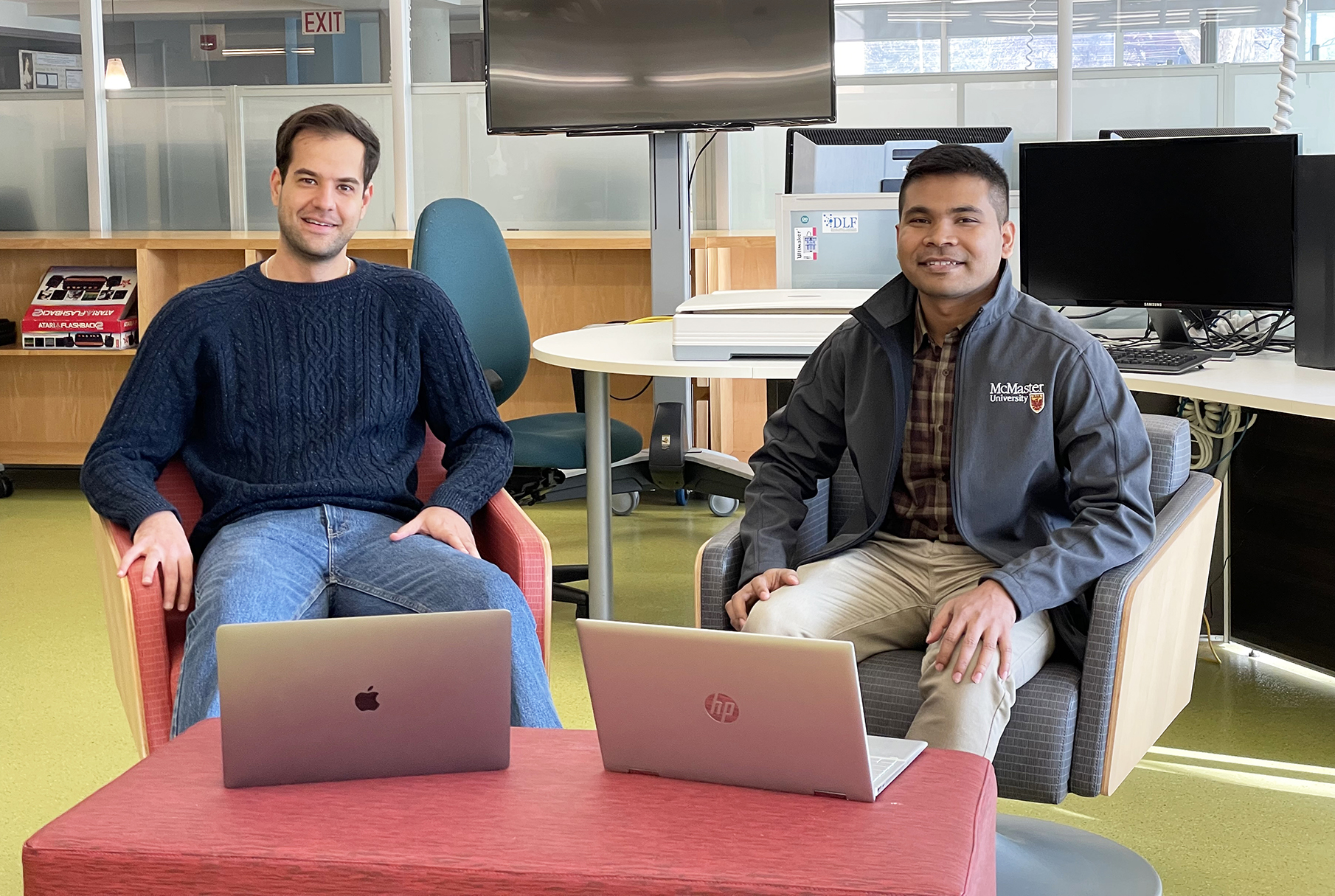
{Link Label}
Mcmaster’s dash team to the rescue for data analysis and software help.
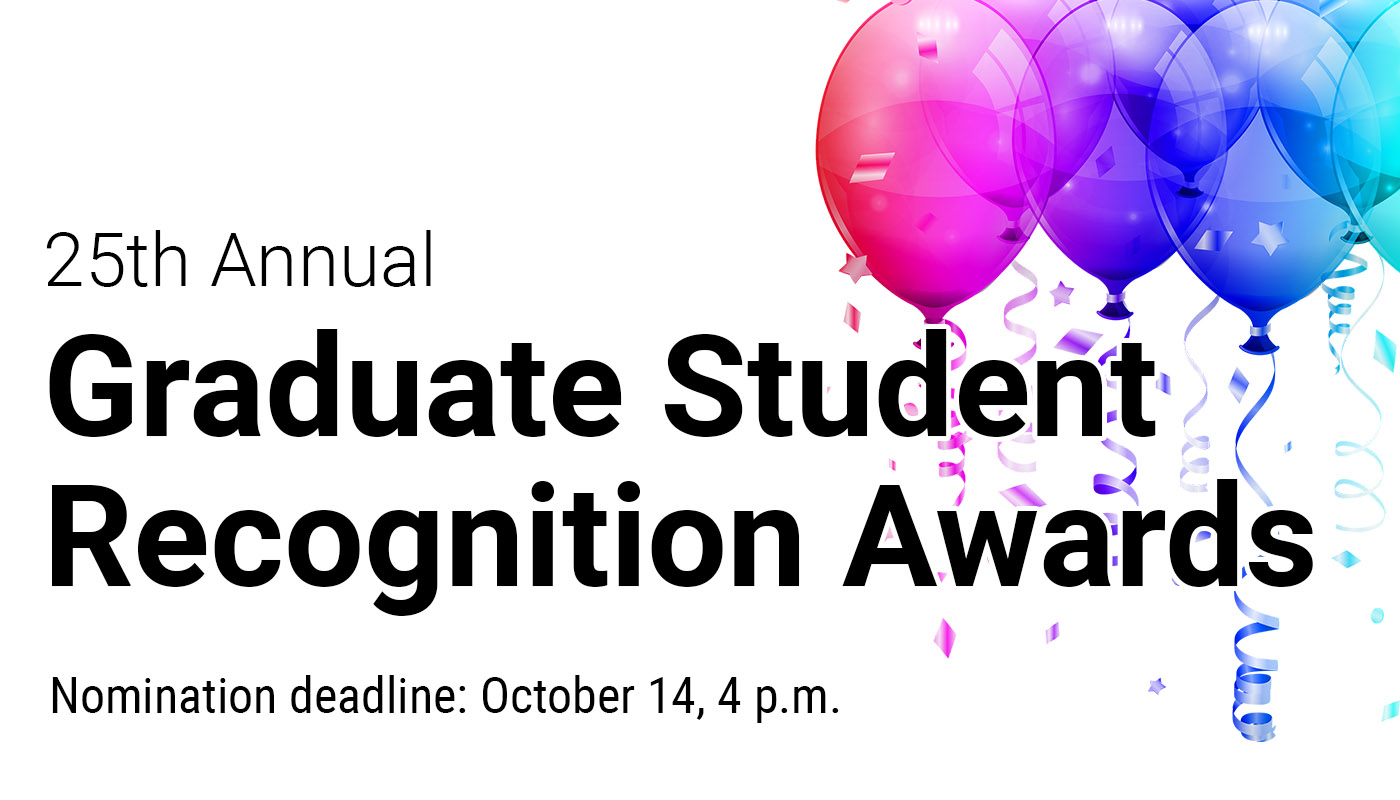
Nominations open for 25th Annual Graduate Student Recognition Awards
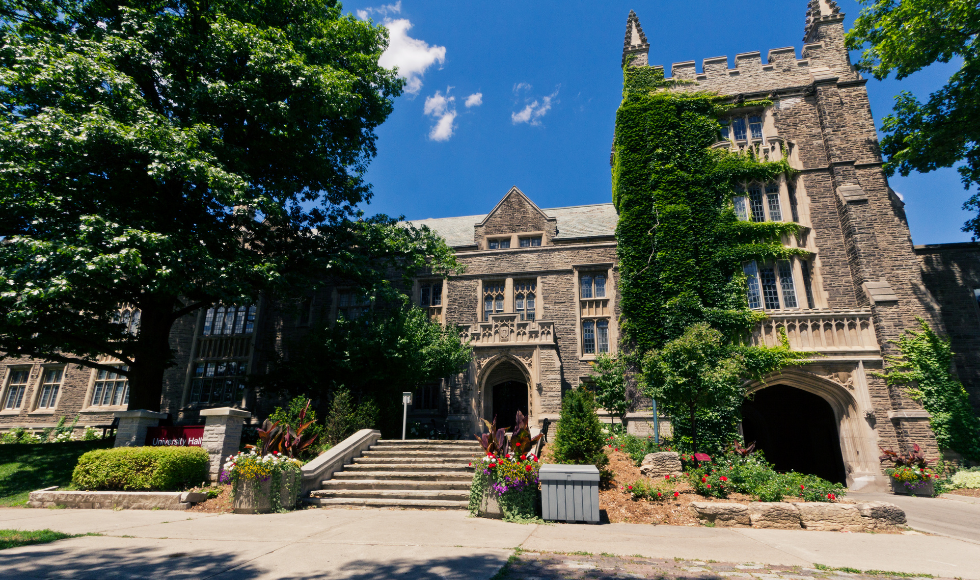
Five grad students receive Wilson Leadership Scholar Award
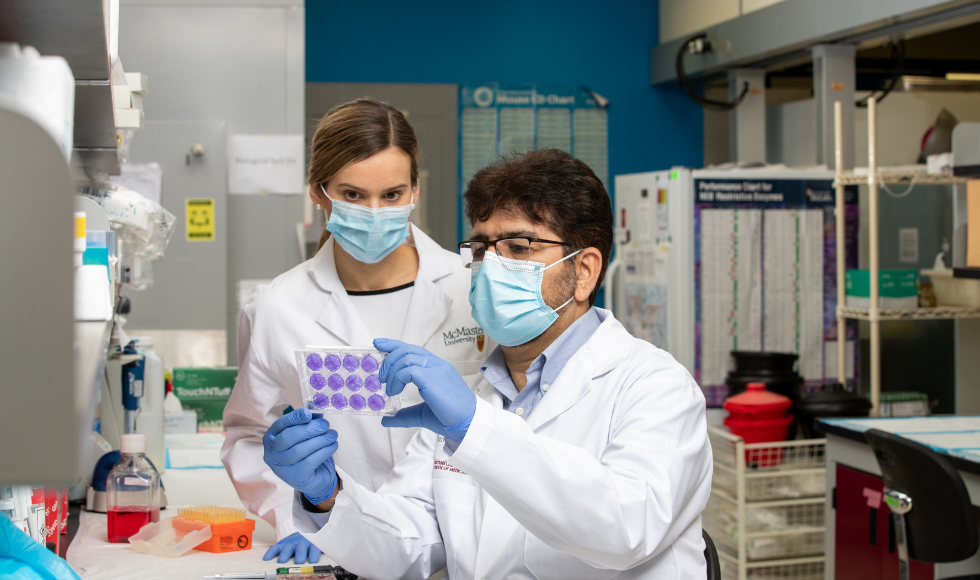
McMaster ranked #1 for graduate student research intensity
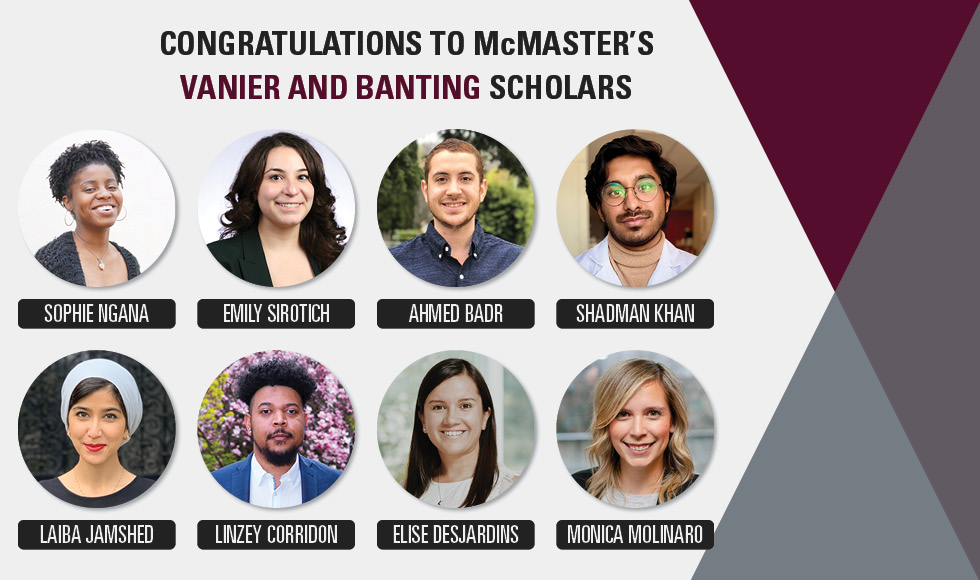
Celebrating our newest Vanier Scholars and Banting Fellow!
In conversation with mcmaster’s graduate studies librarian, leeanne romane.

New MacDATA fellows ready to tease new insights out of complex data
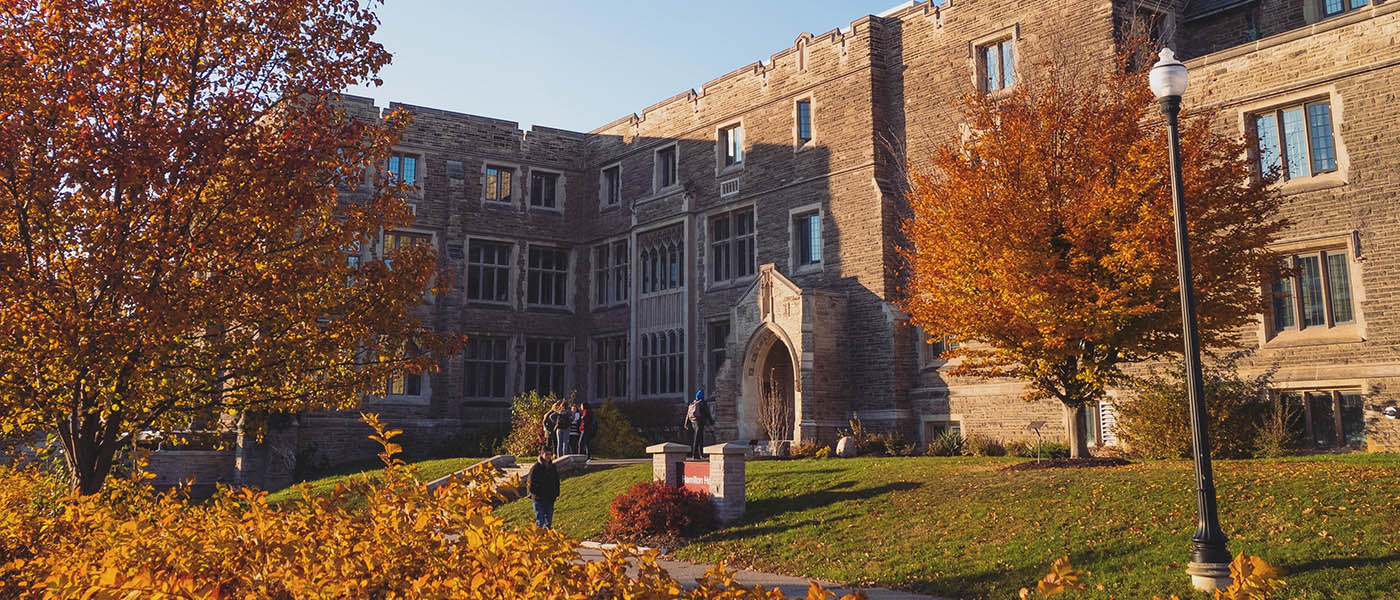
Winter term will be online: Provost’s letter
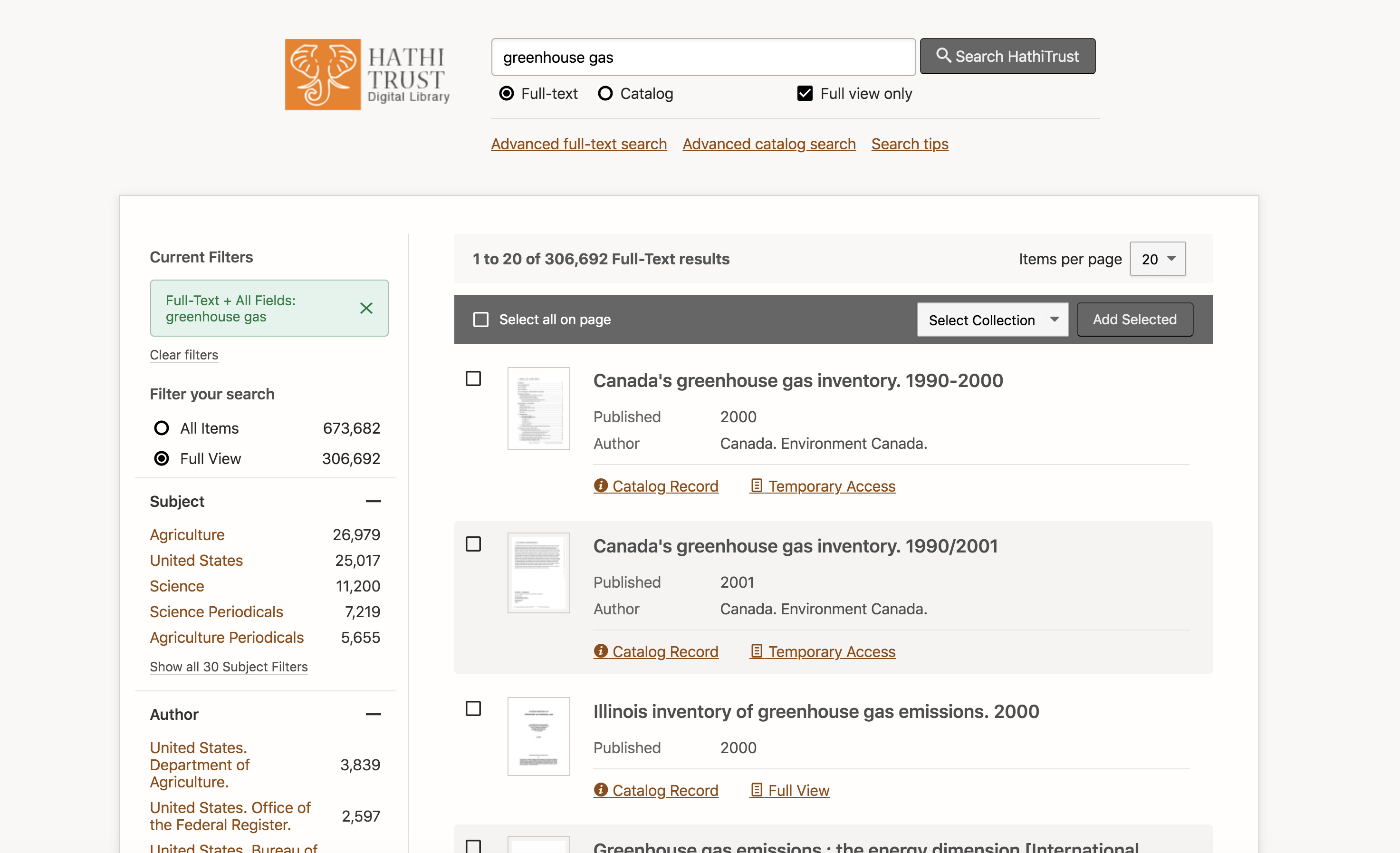
830,000 print books from Library’s collection now digitally available to faculty, students
Tell your research story in the 2020 three minute thesis competition.
School of Graduate Studies
Medical science, program overview.
The Master of Science and Doctor of Philosophy programs in Medical Science are available in a wide range of basic sciences, clinical sciences, and population health research. Under the mentorship of a faculty member, a student receives specialized training and exposure to Toronto’s finest multidisciplinary research. Students conduct research in one of six fields:
- Biomedical Science
- Clinical Science
- Health Professions Education
- Population Health/Health Services
- Radiation Oncology
The full-time MSc and PhD programs emphasize hands-on research, rather than coursework. The Institute of Medical Science (IMS) is the graduate unit of choice for MDs seeking training as clinician investigators, and graduates may seek positions as academics and health-care professionals in universities, government, and industry. The IMS participates in the Royal College of Physicians and Surgeons Clinical Investigator Program (CIP).
Students may also be interested in the combined degree program in Medicine, Doctor of / Doctor of Philosophy (MD/PhD) .
See video: Explore Graduate Programs at the Faculty of Medicine
Quick Facts
Master of science, program description.
The MSc program is available in a wide range of basic sciences, clinical sciences, and population health research. Under the mentorship of a faculty member, a student receives specialized training and exposure to Toronto's finest multidisciplinary research. Students conduct research in one of six fields: Bioethics; Biomedical Science; Clinical Science; Health Professions Education; Population Health/Health Services; and Radiation Oncology.
The program emphasizes hands-on research, rather than coursework. Faculty conduct research in the following areas: cardiovascular sciences, bioethics, neuroscience, membrane biology, respiratory medicine, and psychosomatic medicine. The Institute of Medical Science (IMS) is the graduate unit of choice for undergraduates and MDs seeking training as clinician investigators, and graduates may seek positions as academics and health-care professionals in universities, government, and industry. The IMS participates in the Royal College of Physicians and Surgeons Clinical Investigator Program (CIP).
Students will complete the program in two years over six sessions.
Minimum Admission Requirements
- Applicants are admitted under the General Regulations of the School of Graduate Studies. Applicants must also satisfy the Institute of Medical Science's additional admission requirements stated below.
An appropriate BSc or an MD degree from a recognized university and academic credentials and background preparation appropriate to the field of study. Qualified university graduates with a professional health science degree (for example, MD, BScN) or an undergraduate arts and science degree of appropriate background who wish to pursue graduate studies in basic or clinical biomedical sciences are encouraged to apply.
Applicants lacking adequate background in biological, natural, or social sciences may be required to take undergraduate or graduate courses considered necessary to provide a proper basis for their research.
A– (80%) average in the final year of undergraduate study and an A– cumulative average over three of the four total years of study.
Applicants whose primary language is not English, and who graduated from a university where the language of instruction was not English, must demonstrate proficiency in the English language through the successful completion of one of the following English language proficiency tests:
Test of English as a Foreign Language (TOEFL):
a minimum score of 600 on the paper-based test and 5 on the Test of Written English (TWE); or
a minimum score of 100 on the Internet-based test and 25 on the writing and speaking sections.
International English Language Testing System (IELTS): minimum overall score of 7.5 with at least 6.5 in each component.
Certificate of Proficiency in English (COPE): minimum total of 86 with a minimum writing score of 32, reading score of 22, and listening score of 22. Test of Oral Proficiency assessment band = 7.
Program Requirements
Coursework. Students must complete a minimum of 2.0 graduate full-course equivalent (FCEs) as follows:
0.5 FCE: MSC1010H 0 MSc Student Seminars in Translational Research (Credit/No Credit).
0.5 FCE: MSC modular courses (two courses worth 0.25 FCE each).
1.0 elective FCE.
A research thesis and oral thesis examination .
Program Length
6 sessions full-time (typical registration sequence: F/W/S/F/W/S)
3 years full-time
0 Course that may continue over a program. Credit is given when the course is completed.
Doctor of Philosophy
The PhD program is available in a wide range of basic sciences, clinical sciences, and population health research. Under the mentorship of a faculty member, a student receives specialized training and exposure to Toronto's finest multidisciplinary research. Students conduct research in one of six fields: Bioethics; Biomedical Science; Clinical Science; Health Professions Education; Population Health/Health Services; and Radiation Oncology.
The program emphasizes hands-on research, rather than coursework. Faculty conduct research in the following areas: cardiovascular sciences, bioethics, neuroscience, membrane biology, respiratory medicine, and psychosomatic medicine. The Institute of Medical Science (IMS) is the graduate unit of choice for undergraduates and MDs seeking training as clinician investigators, and graduates may seek positions as academics and health-care professionals in universities, government, and industry. IMS participates in the Royal College of Physicians and Surgeons Clinical Investigator Program (CIP).
Applicants may enter the PhD program via one of three routes: 1) following completion of a two-year, thesis-based MSc degree with a defended MSc thesis; 2) transfer from the IMS MSc program; or 3) direct entry following completion of an appropriate BSc or MD degree.
Completion of the PhD may take longer than the program length indicated below.
PhD Program
Applicants are admitted under the General Regulations of the School of Graduate Studies. Applicants must also satisfy the Institute of Medical Science (IMS)'s additional admission requirements stated below.
Applicants whose primary language is not English, and who graduated from a university where the language of instruction and examination was not English, must demonstrate facility in the English language through the successful completion of one of the following English-language proficiency tests:
Certificate of Proficiency in English (COPE): minimum total score of 86 with minimum writing score of 32, reading score of 22, and listening score of 22. Test of Oral Proficiency assessment band = 7.
Applicants may be accepted into the PhD program after completing a two-year, thesis-based MSc degree (with a defended MSc thesis) with at least an A– standing from a recognized university.
Coursework. Students must complete a minimum of 2.0 graduate full-course equivalents (FCEs) as follows:
0.5 FCE: MSC1011H 0 PhD Student Seminars in Translational Research (Credit/No Credit).
Students may be required to take extra courses in addition to the degree requirements.
Students must pass a qualifying examination within 18 to 21 months of starting the program.
A research thesis must be submitted, and the student must pass an IMS departmental oral examination before proceeding to the Doctoral Final Oral Examination conducted by the School of Graduate Studies.
At the end of Year 3, students must have completed all program requirements exclusive of the thesis research in order to achieve candidacy.
In cases where a student's prior academic background may have covered any of the courses listed above, substitutions will be required. Such substitutions can include any courses in IMS. For courses taken outside of this graduate unit, students should consult with their Graduate Coordinator.
0 Course that may continue over a program. The course is graded when completed.
PhD Program (Transfer)
Transfer requirements.
Applicants may be accepted into the PhD program via transfer from the University of Toronto MSc program. Outstanding students may be considered for reclassification/transfer into the PhD program without writing an MSc thesis.
Students must complete 3.0 graduate full-course equivalents (FCEs) as follows:
1.0 elective FCE with a minimum A– average.
The student will be evaluated in an oral transfer examination within 18 to 21 months of initial graduate registration.
The successful applicant will enter the PhD program and complete:
0.5 FCE: MSC1011H 0 PhD Student Seminars in Translational Research (Credit/No Credit) if credit for MSC1010H has not been obtained prior to transfer.
PhD Program (Direct-Entry)
Students are accepted via direct entry into the PhD program after completing an appropriate BSc or an MD degree, without completing a two-year, thesis-based MSc degree.
Coursework. Students must complete a minimum of 3.0 graduate full-course equivalents (FCEs) as follows:
2.0 elective FCEs.
At the end of Year 4, students must have completed all program requirements exclusive of the thesis research in order to achieve candidacy.
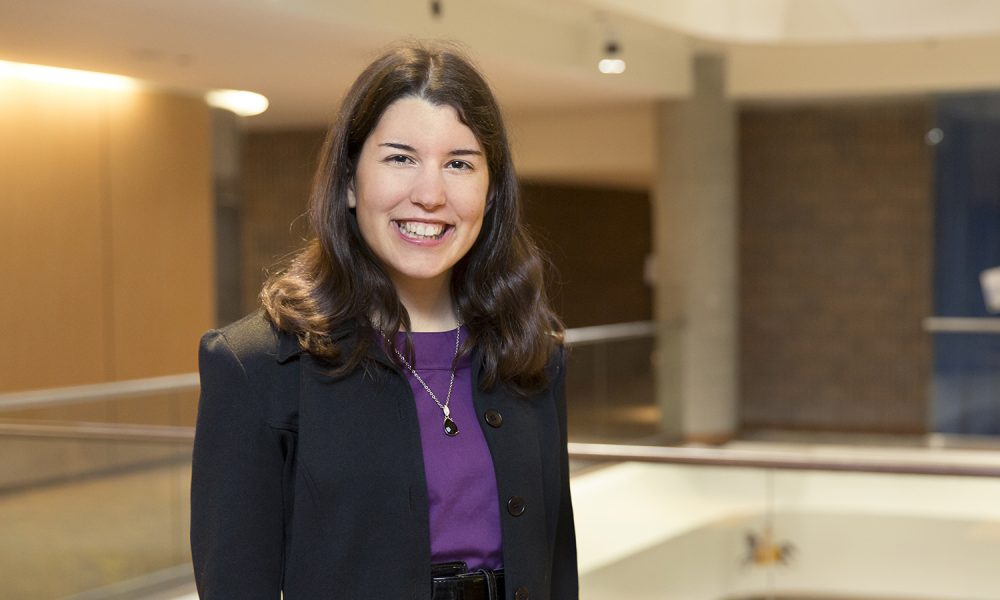
“I wanted to perform research that challenges traditional boundaries.”

- Doctor of Philosophy in Biomedical Engineering (PhD)
- Graduate School
- Prospective Students
- Graduate Degree Programs
Canadian Immigration Updates
Applicants to Master’s and Doctoral degrees are not affected by the recently announced cap on study permits. Review more details
Go to programs search
Biomedical Engineers apply their knowledge in engineering, biology, and medicine to healthcare and medical device industries. Biomedical Engineering is a distinct field that encompasses engineering disciplines, biology, life sciences, medicine, clinical applications, and the improvement of human health. Since 2006, our PhD program has trained students in the fundamentals of Biomedical Engineering, providing extensive research experience in biomechanics, biomaterials, biochemical processing, cellular engineering, imaging, medical devices, micro-electro-mechanical implantable systems, and physiological modeling, simulation, monitoring, and control, as well as medical robotics. Graduates continue on to PhD programs as well as research and development positions in industry and other institutions.
For specific program requirements, please refer to the departmental program website
What makes the program unique?
The Biomedical Engineering Program at UBC is a part of the School of Biomedical Engineering, which falls under both the Faculty of Applied Science and Faculty of Medicine. This unique interdisciplinary structure provides students with unparalleled access to engineering experts across varied Biomedical Engineering research areas at UBC. It emphasizes a balance of biomedical engineering and life science study with a focus on clinical and industrial application. Our graduates have gone on to become industry leaders, especially in the medical device industry, and provide a network of professionals within the community.
Biomedical Engineering at UBC is the only program in Canada to offer the Engineers in Scrubs (EiS) training program. The EiS program began as an NSERC-funded Collaborative Research and Training Experience (CREATE) program designed to foster innovation in medical technology by training biomedical engineers in clinical environments. Students receive a significant portion of their training in hospital settings, and the program focuses on the medical technology innovation process. This program complements the research training of MASc and PhD students and allows them to work closely with medical professionals in identifying clinical problems and developing a solution.
The community at UBC is incredibly diverse and inclusive, providing so many opportunities for research, leadership, and extracurricular activities.
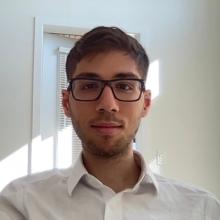
Ahmed Kabil
Quick Facts
Program Enquiries
Admission information & requirements, 1) check eligibility, minimum academic requirements.
The Faculty of Graduate and Postdoctoral Studies establishes the minimum admission requirements common to all applicants, usually a minimum overall average in the B+ range (76% at UBC). The graduate program that you are applying to may have additional requirements. Please review the specific requirements for applicants with credentials from institutions in:
- Canada or the United States
- International countries other than the United States
Each program may set higher academic minimum requirements. Please review the program website carefully to understand the program requirements. Meeting the minimum requirements does not guarantee admission as it is a competitive process.
English Language Test
Applicants from a university outside Canada in which English is not the primary language of instruction must provide results of an English language proficiency examination as part of their application. Tests must have been taken within the last 24 months at the time of submission of your application.
Minimum requirements for the two most common English language proficiency tests to apply to this program are listed below:
TOEFL: Test of English as a Foreign Language - internet-based
Overall score requirement : 93
IELTS: International English Language Testing System
Overall score requirement : 6.5
Property field_prog_lang_test_min
Other Test Scores
Some programs require additional test scores such as the Graduate Record Examination (GRE) or the Graduate Management Test (GMAT). The requirements for this program are:
The GRE is not required.
Prior degree, course and other requirements
Prior degree requirements.
Applicants to the BME program should normally hold a research master's degree in engineering or a closely-related degree with significant technical, analytical and mathematical components (e.g., physics, biophysics, chemistry, computer science). Students with degrees in other fields (e.g., life sciences, kinesiology, physical therapy) may be considered for the program if they have adequate technical preparation. In exceptional cases, applicants from Canadian or US institutions who hold a bachelor's degree with an overall average in the A grade range and who demonstrate advanced research ability may be granted direct admission to our doctoral degree program. Please see the Faculty of Graduate and Postdoctoral Studies website for more information. Applicants from international institutions will have specific minimum admission requirements established by the Faculty of Graduate and Postdoctoral Studies.
2) Meet Deadlines
January 2025 intake, application open date, canadian applicants, international applicants, deadline explanations.
Deadline to submit online application. No changes can be made to the application after submission.
Deadline to upload scans of official transcripts through the applicant portal in support of a submitted application. Information for accessing the applicant portal will be provided after submitting an online application for admission.
Deadline for the referees identified in the application for admission to submit references. See Letters of Reference for more information.

3) Prepare Application
Transcripts.
All applicants have to submit transcripts from all past post-secondary study. Document submission requirements depend on whether your institution of study is within Canada or outside of Canada.
Letters of Reference
A minimum of three references are required for application to graduate programs at UBC. References should be requested from individuals who are prepared to provide a report on your academic ability and qualifications.
Statement of Interest
Many programs require a statement of interest , sometimes called a "statement of intent", "description of research interests" or something similar.
Supervision
Students in research-based programs usually require a faculty member to function as their thesis supervisor. Please follow the instructions provided by each program whether applicants should contact faculty members.
Instructions regarding thesis supervisor contact for Doctor of Philosophy in Biomedical Engineering (PhD)
Citizenship verification.
Permanent Residents of Canada must provide a clear photocopy of both sides of the Permanent Resident card.
4) Apply Online
All applicants must complete an online application form and pay the application fee to be considered for admission to UBC.
Research Information
Research highlights.
Recent research highlights include: Overdoes Detection Device, Surgical Screw Cover, Magnetic Drug Implant, Parkinson’s App Painless, and Inexpensive Microneedle System Non-Invasive Migraine Monitoring Technique
Research Focus
UBC Biomedical Engineering researchers work in a wide range of areas. Our main research themes include Cellular and Molecular Engineering (including Regenerative Medicine, Synthetic Biology, and Imumune Engineering); Imaging and Computational Biology (including AI & Multiscale Imaging, Bioinformatics/Systems Biology, and Computational Modeling & Automation); Human Interfacing Devices (including Therapeutic Delivery Systems & Nanodevices, Bionics & Bio-Sensors, Biomaterials, and Biomechanics/Injury Prevention).
We are now building capacity to increase research opportunities in areas of global importance including molecular and cellular engineering and synthetic biology, genomics and nano-devices, immune-engineering and advanced biomaterials, regenerative medicine, artificial intelligence and simulation systems with biomedical application, visualization and imaging from nanomolecular to physiological scales.
Tuition & Financial Support
Financial support.
Applicants to UBC have access to a variety of funding options, including merit-based (i.e. based on your academic performance) and need-based (i.e. based on your financial situation) opportunities.
Program Funding Packages
The majority of PhD students are offered research assistantships (RAs) by faculty members. RAs are funded by research grants for specific projects which almost always constitute thesis projects. Although you will automatically be considered for an RA when submitting your online application, to successfully secure an RA appointment you are encouraged to make contact with a research supervisor. The number of RAs offered will vary depending on lab and research space as well as available funding.
From September 2024 all full-time students in UBC-Vancouver PhD programs will be provided with a funding package of at least $24,000 for each of the first four years of their PhD. The funding package may consist of any combination of internal or external awards, teaching-related work, research assistantships, and graduate academic assistantships. Please note that many graduate programs provide funding packages that are substantially greater than $24,000 per year. Please check with your prospective graduate program for specific details of the funding provided to its PhD students.
Average Funding
- 28 students received Teaching Assistantships. Average TA funding based on 28 students was $6,360.
- 55 students received Research Assistantships. Average RA funding based on 55 students was $24,643.
- 6 students received Academic Assistantships. Average AA funding based on 6 students was $5,499.
- 61 students received internal awards. Average internal award funding based on 61 students was $7,444.
- 12 students received external awards. Average external award funding based on 12 students was $23,014.
Scholarships & awards (merit-based funding)
All applicants are encouraged to review the awards listing to identify potential opportunities to fund their graduate education. The database lists merit-based scholarships and awards and allows for filtering by various criteria, such as domestic vs. international or degree level.
Graduate Research Assistantships (GRA)
Many professors are able to provide Research Assistantships (GRA) from their research grants to support full-time graduate students studying under their supervision. The duties constitute part of the student's graduate degree requirements. A Graduate Research Assistantship is considered a form of fellowship for a period of graduate study and is therefore not covered by a collective agreement. Stipends vary widely, and are dependent on the field of study and the type of research grant from which the assistantship is being funded.
Graduate Teaching Assistantships (GTA)
Graduate programs may have Teaching Assistantships available for registered full-time graduate students. Full teaching assistantships involve 12 hours work per week in preparation, lecturing, or laboratory instruction although many graduate programs offer partial TA appointments at less than 12 hours per week. Teaching assistantship rates are set by collective bargaining between the University and the Teaching Assistants' Union .
Graduate Academic Assistantships (GAA)
Academic Assistantships are employment opportunities to perform work that is relevant to the university or to an individual faculty member, but not to support the student’s graduate research and thesis. Wages are considered regular earnings and when paid monthly, include vacation pay.
Financial aid (need-based funding)
Canadian and US applicants may qualify for governmental loans to finance their studies. Please review eligibility and types of loans .
All students may be able to access private sector or bank loans.
Foreign government scholarships
Many foreign governments provide support to their citizens in pursuing education abroad. International applicants should check the various governmental resources in their home country, such as the Department of Education, for available scholarships.
Working while studying
The possibility to pursue work to supplement income may depend on the demands the program has on students. It should be carefully weighed if work leads to prolonged program durations or whether work placements can be meaningfully embedded into a program.
International students enrolled as full-time students with a valid study permit can work on campus for unlimited hours and work off-campus for no more than 20 hours a week.
A good starting point to explore student jobs is the UBC Work Learn program or a Co-Op placement .
Tax credits and RRSP withdrawals
Students with taxable income in Canada may be able to claim federal or provincial tax credits.
Canadian residents with RRSP accounts may be able to use the Lifelong Learning Plan (LLP) which allows students to withdraw amounts from their registered retirement savings plan (RRSPs) to finance full-time training or education for themselves or their partner.
Please review Filing taxes in Canada on the student services website for more information.
Cost Estimator
Applicants have access to the cost estimator to develop a financial plan that takes into account various income sources and expenses.
Career Outcomes
8 students graduated between 2005 and 2013. Of these, career information was obtained for 7 alumni (based on research conducted between Feb-May 2016):
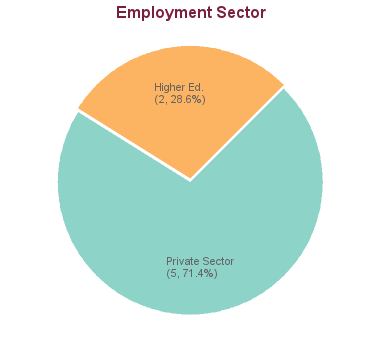
Sample Employers in Higher Education
Sample employers outside higher education, sample job titles outside higher education, phd career outcome survey, career options.
The PhD program in Biomedical Engineering is designed to prepare students for employment in the public or private sector, or to pursue further studies. Graduates find employment at academic institutions and in high level research and development positions in industry and other institutions. Recent graduates have gone on to work at BCIT, Phillips, and Precision Nanosystems. A burgeoning field, ample opportunities exist in the medical instrument industry, pharmaceutical/biochemical industry, hospitals, medical research facilities and educational institutions, and regulatory bodies, governments, and industry associations.
Enrolment, Duration & Other Stats
These statistics show data for the Doctor of Philosophy in Biomedical Engineering (PhD). Data are separated for each degree program combination. You may view data for other degree options in the respective program profile.
ENROLMENT DATA
Completion rates & times.
- Research Supervisors
Advice and insights from UBC Faculty on reaching out to supervisors
These videos contain some general advice from faculty across UBC on finding and reaching out to a supervisor. They are not program specific.

This list shows faculty members with full supervisory privileges who are affiliated with this program. It is not a comprehensive list of all potential supervisors as faculty from other programs or faculty members without full supervisory privileges can request approvals to supervise graduate students in this program.
- Abolmaesumi, Purang (Electrical engineering, computer engineering, and information engineering; Medical and biomedical engineering; Artificial Intelligence; Biomedical Engineering; Biomedical Technologies; Cancer Imaging; Computer Assisted Interventions; Image Guided Surgery; Machine Learning; Medical Imaging; Surgical Robotics; Ultrasound Imaging)
- Bacca, Mattia (Mechanical engineering; Medical and biomedical engineering; Solid Mechanics; Biophysics; Soft materials; Fracture Mechanics and Adhesion)
- Bamji, Shernaz (Medical and biomedical engineering; Neurosciences, biological and chemical aspects; Neurosciences, medical and physiological and health aspects; neurodevelopmental disease; primary neuronal cultures; synapse biology; transgenic mouse models)
- Bashashati Saghezchi, Ali (Bioinformatics; Medical and biomedical engineering; Artificial Intelligence; Computational Pathology; Cancer Genomics; Computational Biology; Digital Pathology; Image Processing; Machine Learning; Ovarian Cancer; Signal Processing; Multi-modal Learning)
- Blakney, Anna (Biomedical materials; Medical molecular engineering of nucleic acids and proteins; Gene and molecular therapy; Gene delivery; RNA; Biomaterials; Immunoengineering)
- Cembrowski, Mark Steven (Molecular neuroscience; Mathematical modelling and simulation; Mechanisms of memory in the brain; Anxiety; Big Data; Bioinformatics; Cell types; Computation; CRISPR-Cas9; Fear; Genetics; modeling; Neural circuits; neuroscience; Neuroscience of memory; PTSD; RNAseq)
- Cheung, Karen (Electrical engineering, computer engineering, and information engineering; Medical and biomedical engineering; additive manufacturing; BioMEMS; Biomedical Technologies; biosensors; microfluidics; neural interfaces; organ-on-chip; Tissue Engineering)
- Chiao, Mu (MEMS, Micro Sensors, Micro Actuators, BioMEMS, Nanotechnology, Bioengineering, Electronic Packaging, Nanoscience, Energy sources for micro-electro-mechanical systems)
- Conway, Edward (Basic medicine and life sciences; coagulation; Innate immunity; Inflammation; vascular biologh)
- Cripton, Peter (Mechanical engineering; Medical and biomedical engineering; biomechanics; Cranio-Encephalic and Spinal Cord Trauma; hip fracture; injury prevention; Mechanical Systems; neurotrauma; Spinal cord injury; spine biomechanics; Trauma / Injuries; Traumatic Brain Injury; Sex Differences in Seat Belt Performance)
- de Boer, Carl (Gene regulation)
- Dumont, Guy A (biomedical engineering; automatic drug delivery; mobile health; global health; anesthesia; physiological monitoring;, Adaptive control, predictive control, control of distributed parameters systems, advanced process control, applications of wavelet analysis, biomedical applications of control, pulp and paper process control)
- Fels, S Sidney (Human computer interaction, human 3D biomechanical modeling, speech synthesis, medical applications of modeling, computer vision, interactive arts and music)
- Field, Thalia (stroke; Clinical trials; cerebral venous thrombosis; outcomes; cognition; Machine Learning)
- Garbi, Rafeef (Bioinformatics; Electrical engineering, computer engineering, and information engineering; Medical and biomedical engineering; Artificial Intelligence; Biomedical Engineering; Biomedical Technologies; Computer Vision; Deep Learning; image analysis; Imaging; Machine Learning; Medical Image Computing)
- Goerges, Matthias (Electronic health (e-Health); Health information systems (including surveillance); Expert systems technologies in artificial intelligence; Anesthesiology; Medical devices; Human-computer systems and interface; Bio-signal processing and analysis; Digital health; predictive analytics; decision support systems; Critical Care Medicine; Biomedical Technologies; Health Care Technologies; Human Computer Interaction and Design; Medical informatics; Software Development; patient-oriented research; Data sharing / open data)
- Grecov, Dana (Rheology, Rheometry, Non-Newtonian Fluid Mechanics, Computational Fluid Mechanics, Liquid Crystals, Biolubricants, Lubricants, Journal Bearings, Multi-Phase Flow, Synovial Joints, Synovial Fluid, Arthrithis, Liquid crystals and nanomaterials, Biofluid Mechanics)
- Haas, Kurt (Medical and biomedical engineering; Neurosciences, biological and chemical aspects; Neurosciences, medical and physiological and health aspects; Autism; Brain Circuit Development; Dendritogenesis; Epilepsy; Genetics of Neurological and Psychiatric Diseases; Neurodevelopmental disorders; Neurological diseases; Neuronal Communication and Neurotransmission; Neuronal Computation; Neuronal Modeling; Neuronal Systems; Neuronal and Synaptic Activity; Plasticity / Neuronal Regeneration; Synaptic Plasticity)
- Hacihaliloglu, Ilker (Bio-signal processing and analysis; Medical biotechnology; Biomedical signal processing; Image guided surgery systems; Medical and biomedical engineering, n.e.c.; Data analytics and signal processing, n.e.c.; Artificial intelligence (AI); Extraction of relevant information from 3D medical images; Image Guided Surgery; computer assisted diagnosis; Deep Learning; point of care ultrasound; ultrasound image processing; Brain Health; orthopedic surgery; liver disease; lung disease; traumatic Brian injury; neurosurgery; Biomedical Engineering)
- Hodgson, Antony (Image guided surgery systems; computer assisted orthopaedic surgery; Medical Imaging; surgical navigation; orthopaedics; biomechanics; surgical robots; Image Processing; Machine Learning)
- Hoodless, Pamela (Computational cell biology; Cancer; Genomics; Medical and biomedical engineering; Nucleic acids studies; Developmental Genetics; Embryology; Embryonic Development; Epigenetics; Heart Valve / Valvular Diseases; Heart valve formation; Liver; Liver development; Stem Cells and Organogenesis; transcriptional regulation)
- Ju, Myeong Jin (Medical and biomedical engineering; algorithms for quantitatively imaging biological dynamics in human retina; cellular resolution functional retinal imaging systems; Medical Imaging; optical imaging systems; signal processing algorithms)
- Kaigala, Govind (enabling technologies for healthcare and life-sciences; new concepts and devices (liquid scanning probes) for manipulating biointerfaces)
- Karsan, Aly (Hematological tumours; Cancer molecular targets; Leukemia; Hematopoiesis; Genomics and epigenomics; Noncoding RNAs; Aging)
Doctoral Citations
Sample thesis submissions.
- High T-cell concentration bioprocessing for cell therapy manufacturing
- The interplay between gene regulatory networks and cell signaling: engineering the collective behaviour
- Flexible polymer-based capacitive micromachined ultrasonic transducers (polyCMUTs) for conformal sonography
- Development of a microfluidic human airway-on-a-chip with cell-laden hydrogel for studying aerosol inhalation exposure with application demonstrated using whole wood smoke
- Biomaterials-mediated blood stem cell engineering
- Towards improving prostate cancer diagnosis and treatment with shear wave absolute vibro-elastography and automatic low-dose-rate prostate brachytherapy planning
- Process parameter development for the scaled generation of stem cell-derived pancreatic endocrine cells
- Improving data acquisition from 3-D microtissues in image-based cancer drug screening
- An integrated system for ultrasound-based surgical navigation of iliosacral screws
- Development of polarization speckle methods for clinical melanoma evaluation
- Engineering the thymic niche for T-cell differentiation from stem cells
- Management of noncompressible truncal hemorrhage with injectable self-dispersing hemostatic formulations
- Bioprocess engineering of cell encapsulation
- Quantification of femoroacetabular impingement and its contribution to hip pain
Related Programs
Same specialization.
- Master of Applied Science in Biomedical Engineering (MASc)
- Master of Engineering in Biomedical Engineering (MEng)
At the UBC Okanagan Campus
- Doctor of Philosophy (PhD), Engineering
Further Information
Specialization.
Biomedical Engineering is a multidisciplinary field that involves the application of engineering techniques and technologies to medical and healthcare areas. Opportunities for interdisciplinary education and research exist in areas such as biomechanics, biomaterials, biochemical processing, cellular engineering, imaging, medical devices, micro-electro-mechanical implantation systems, physiological modelling, simulation, monitoring and control, as well as medical robotics.
UBC Calendar
Program website, faculty overview, academic unit, program identifier, classification, social media channels, supervisor search.
Departments/Programs may update graduate degree program details through the Faculty & Staff portal. To update contact details for application inquiries, please use this form .

Yas Oloumi Yazdi
I had completed my undergraduate degree at UBC. I was familiar with the campus and the city. My family also lives in Vancouver and being able to stay close to them while studying at one of the top engineering schools in the world with such a beautiful campus seemed like the ideal and obvious choice.
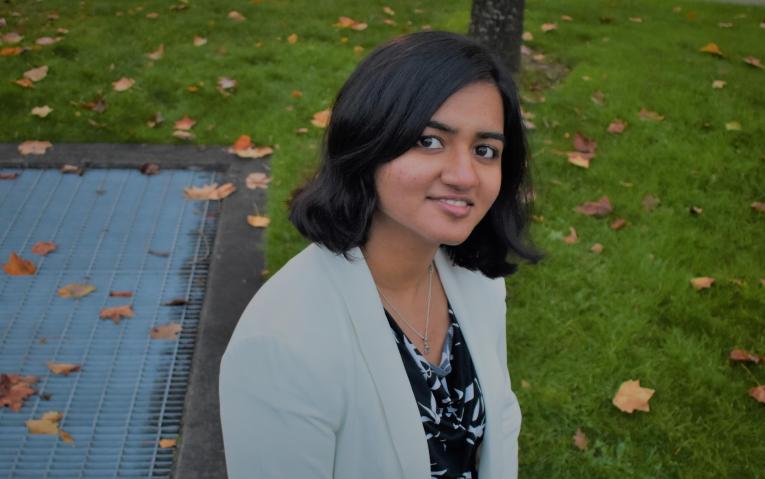
Neha Suvindran
I was drawn to the unique Engineers in Scrubs (EiS) Program offered at UBC. It is a one-of-a-kind program in which graduate students get to work alongside clinicians and stakeholders to solve real-world healthcare problems. Moreover, my supervisor Prof. Peyman Servati is the director of STITCH (...
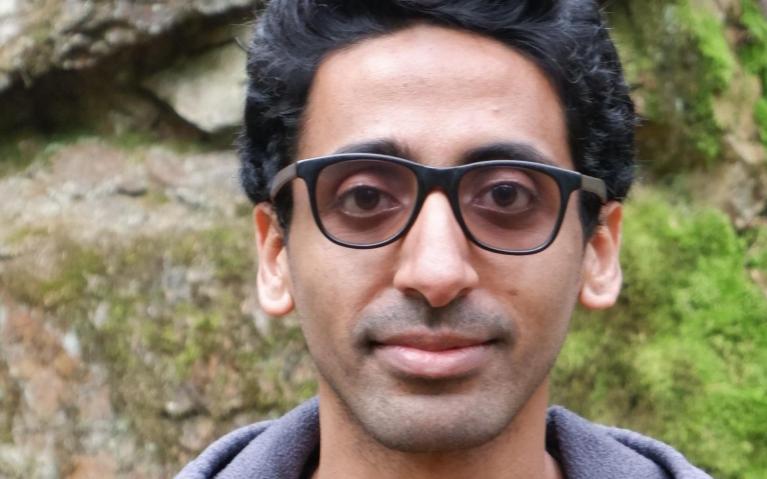
Omar Bashth
UBC has a very strong stem cell community that fosters great collaborations between labs and institutes. I am excited and privileged to be close to this community to learn and contribute to the science.

Considering UBC for your graduate studies?
Here, you can choose from more than 300 graduate degree program options and 2000+ research supervisors. You can even design your own program.
- Why Grad School at UBC?
- Application & Admission
- Info Sessions
- Research Projects
- Indigenous Students
- International Students
- Tuition, Fees & Cost of Living
- Newly Admitted
- Student Status & Classification
- Student Responsibilities
- Supervision & Advising
- Managing your Program
- Health, Wellbeing and Safety
- Professional Development
- Dissertation & Thesis Preparation
- Final Doctoral Exam
- Final Dissertation & Thesis Submission
- Life in Vancouver
- Vancouver Campus
- Graduate Student Spaces
- Graduate Life Centre
- Life as a Grad Student
- Graduate Student Ambassadors
- Meet our Students
- Award Opportunities
- Award Guidelines
- Minimum Funding Policy for PhD Students
- Killam Awards & Fellowships
- Policies & Procedures
- Information for Supervisors
- Dean's Message
- Leadership Team
- Strategic Plan & Priorities
- Vision & Mission
- Equity, Diversity & Inclusion
- Initiatives, Plans & Reports
- Graduate Education Analysis & Research
- Media Enquiries
- Newsletters
- Giving to Graduate Studies
Strategic Priorities
- Strategic Plan 2019-2024
- Improving Student Funding
- Promoting Excellence in Graduate Programs
- Enhancing Graduate Supervision
- Advancing Indigenous Inclusion
- Supporting Student Development and Success
- Reimagining Graduate Education
- Enriching the Student Experience
Initiatives
- Public Scholars Initiative
- 3 Minute Thesis (3MT)
- PhD Career Outcomes
- Great Supervisor Week
Biomedical Sciences
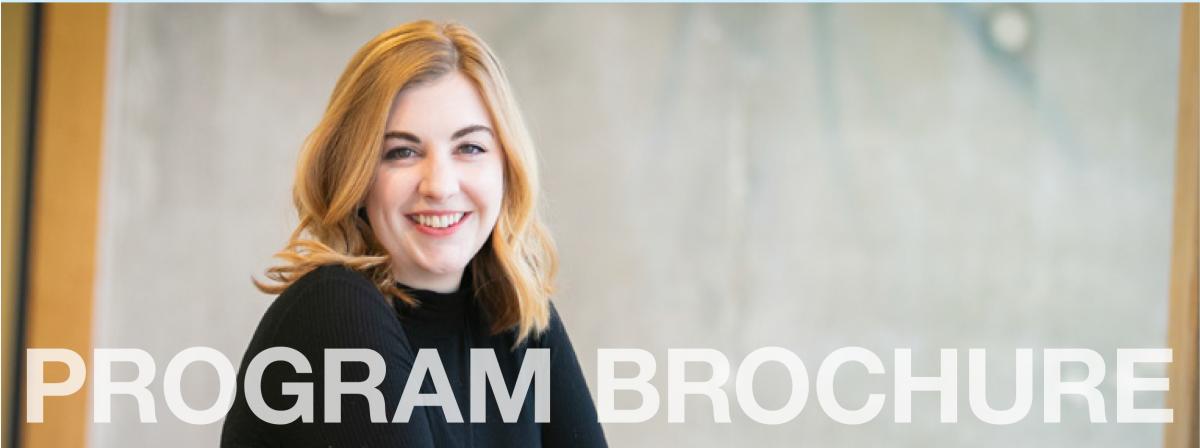
Biomedical Sciences: MBS, MSc, PhD Program Brochure PDF
Graduate Calendar – Biomedical Sciences
- Biomedical Toxicology and Pharmacology
- Cancer Biology
- Cardiovascular Physiology
- Cellular and Molecular Basis of Health & Disease
- Neuroscience
- Reproductive Biology and Development
- Stem Cell Biology and Regenerative Medicine
Domestic Students Application Deadlines: Fall: June 1 Winter: December 2 Spring: February 1
International Student Application Deadlines: Fall: March 1 Winter: July 1 Spring: November 1
College: Ontario Veterinary College
Department: Biomedical Sciences Website
Program Websites: Master of Biomedical Sciences (MBS) MSc Biomedical Sciences PhD Biomedical Sciences
Program Contact: Heather Hamilton, Graduate Program Assistant [email protected] 519-824-4120 x54780
Meet Some of Our Graduate Students
Kathy jacyniak, laura austin.
2020 MSc Biomedical Sciences
Eric Lawton
2019 PhD Biomedical Sciences with Neuroscience
2021 MSc Biomedical Sciences
Ari Mendell
Allyssa hooper.
2018 MSc Biomedical Sciences
2022 PHD.BMED+NEUR
Bianca Garlisi
PhD Biomedical Sciences
Meet Some of Our Graduate Faculty
Jibran khokhar, giannina descalzi, tami martino, samantha payne, laura favetta, melissa perreault, alicia viloria-petit.
- LinkedIn - LinkedIn
- Twitter - Twitter
- Instagram - Instagram
- Facebook - Facebook
When setting your preferences, you disabled the cookies allowing the chat bubble. If you wish to view it, enable the functionality cookies.
You can also find the answers you’re looking for by contacting us .
- Undergraduate programs
- Graduate programs
- Understanding the types of programs
- Programs offered next semester
- Programs open to English-speaking students
- Administration and Management Sciences
- Arts and Music
- Communication
- Economics and Politics
- Environment and Sustainable Development
- Environmental Planning and Design
- Fundamental and Applied Sciences
- Health Sciences
- Information and Communication Technologies
- Individualized programs
- Life Sciences
- Literature and Languages
- Social Sciences
- Social Sciences and Social Action
- Teaching and Education Sciences
- Theology and Religious Sciences
Find your path
Discover programs based on your areas of interest
Test your compatibility with our study programs
- Make an informed choice
- Verify eligibility conditions
- Respect official deadlines
- Obtain recognition of prior learning
- Submit an application
- Change program
- Pay the application fees
- Submit supporting documents
- Access the Centre étudiant
- Track your application in the Centre étudiant
- Modify the application
- Receive a response
- Request admission reconsideration
- Plan your next steps
- Quebec student
- Canadian student (outside of Quebec)
- International student
Can't find what you're looking for?
- Live campus life
- Explore student services
- Join our team of ambassadors
- Innovate through research
Hints, tips and advice to keep you on track
- Download our admission brochure
- Financing your studies at UdeM
- Find your research supervisor
- Find your ideal program with Affiniti
- Find your path with Career Quiz
- Get help with French
- Upcoming events
- Summer Immersion Program
- You don't have an account?
- Create your account
Langue/language
Faculty of Arts and Sciences
PhD in Biological Sciences
Graduate 3-235-1-0
Language accommodations
Although Université de Montréal is a French-language university, many of our research departments are open to creating a bilingual environment for students in graduate-level programs. These departments are aware of the importance of bilingualism in order for graduate students to succeed in their research careers.
Students who are proficient in English are therefore welcome and accepted into graduate-level programs.
Courses and specifics
- Dissertation or thesis track
- International exchange option
Admission requirements
Be sure to select your choices to display the eligibility conditions that apply to you.
- Letter of acceptance from a research supervisor
- Financial plan (fill out the Financial Resources form ) (in French only)
- Curriculum vitae
- Three letters of recommendation – these letters are only required for candidates who have not completed their Master's in Biological Sciences at Université de Montréal
- Outline of a research project (200 to 500 words)
The maximum length is 15 sessions (five years) for full-time students, excluding preparatory or “on leave” sessions. This deadline may be extended by one year with the permission of the department director.
Costs and financial aid
$2,022.23 *
*Total for a full-time session of 15 credits
Tuition fees: $1,440.45
Other fees: $581.78
These amounts are estimates and do not account for other expenses, such as costs for insurance, residence, transportation, manuals, etc.
Check your legal status
These estimates cannot at any time subsitute for an invoice or be used as proof for any reason whatsoever. These calculations are based on the 2023-2024 academic year. Information updated: May 19, 2023
Good news! You may be able to lower this amount!
Under certain conditions, Canadian students who are not residents of Quebec can follow university study programs offered in French while benefiting from the same tuition fees as residents of Quebec.
Check eligibility criteria
$9,435.98 *
Tuition fees: $8,854.20
As an international student, you have access to exemption scholarships granted by UdeM throughout your university program. Note that for ungraduated programs, you must be enrolled as a full-time student for two sessions and reside in Quebec in the case of exclusively online study programs.
Find out about the UdeM exemption scholarship
Future prospects Pursuing a career or further studies? The choice is yours!
Need info on the program, research activities.
Get a head start by discovering what's been written on the topic.
Report a change (internal usage)
The University of Manitoba campuses are located on original lands of Anishinaabeg, Ininew, Anisininew, Dakota and Dene peoples, and on the National Homeland of the Red River Métis. More
University of Manitoba
University of Manitoba Winnipeg, Manitoba Canada, R3T 2N2
Biological Sciences (PhD)
No matter where your interests in the life sciences may lie, the Biological Sciences department provides exceptional opportunities for learning and mentorship to all students.The PhD in Biological Sciences offers more intensive training in research and application in a broad range of biological disciplines.
Program details
Admission requirements.

• Faculty of Science • Faculty of Graduate Studies
• Doctor of Philosophy
Expected duration
• 4-6 years
Study with us
Faculty members at the Department of Biological Sciences offer a great breadth of research expertise and teaching excellence in areas of biological sciences, including gene regulation and development, microscopy, evolution, environmental physiology, animal behaviour, food web dynamics, invertebrate biology and population ecology.
Their research and teaching programs span the globe, from here in Manitoba to the East, West and Arctic Coasts of Canada to international collaborations in locales like South Africa and Costa Rica.
Explore the research in Biological Sciences
Discover our scholarships, awards and other financial supports
There are numerous scholarships, bursaries and prizes available for graduate students in biological sciences.
Learn more about our financial supports .
Explore our unique facilities
The Buller Greenhouse , Stewart Hay Memorial Museum and WIN Herbarium are three of the most unique facilities in the field of biological science, housing collections of thousands of biological specimens that offer students hands-on experience and transformational learning opportunities.
Open the door with career opportunities
A degree in biological sciences is your launchpad to a wide variety of career and professional opportunities. The critical thinking, analysis, writing and communication skills developed over the course of your degree open up a world of endless possibilities, including many exciting careers in fields such as:
- Research and development
- Conservation and environment
- Industry, marketing and communications
Our program can also be used as a stepping stone to professional programs such as medicine, veterinary medicine, pharmacy, dentistry, therapies and environmental law, or to further research opportunities through graduate programs.
Biological Sciences Graduate Student Association (BSGSA)
The BSGSA supports graduate students through the organization of student-oriented events, provides information on academic resources, hosts student- and invited speaker- research seminars and provides a link between students and their community. All biology graduate students are automatically members of the BSGS.
Learn more about the BSGSA .

The Department of Biological Sciences offers a program of study leading to a PhD in Biological Sciences.
Expected duration: 4 years
The PhD program consists of a combination of coursework and a substantial thesis component.
Tuition and fees: Tuition fees are charged for terms one and two and terms four and five. A continuing fee is paid for term three, term six and each subsequent term. (Refer to Graduate tuition and fees .)
In addition to the minimum course requirements of the Faculty of Graduate Studies found in the Graduate Studies Regulations Section , students must:
- Complete a minimum of 6 credit hours of graded coursework at the 7000 level (including BIOL 7220)
- Present and pass a thesis proposal
- Complete a candidacy exam
- Present at least one public seminar on their thesis
- Complete and successfully defend a research-based thesis
Thesis proposal
- Biological Sciences - PhD proposal information (PDF)
Candidacy exam
- Biological Sciences - Initial preparation candidacy exam (PDF)
- Biological Sciences - Recommended steps to prepare for candidacy exam (PDF)
- Biological Sciences - Generalized candidacy exam timeline (PDF)
Sample course offerings
- BIOL 7100: Core Skills in Biological Sciences Research
- BIOL 7140: Advanced Physiology
- BIOL 7220: Critical Thinking in Biological Sciences
- BIOL 7230: Advanced Topics in Zoology
- BIOL 7240: Wetland Ecology
- BIOL 7360: Problems in Biological Statistics
- BIOL 7450: Methods and Approaches to the Analysis of Biological Data Part 2
- BIOL 7502: Cell and Developmental Biology
- BIOL 7554: Molecular Biology of Eukaryotes (DNA)
- BIOL 7880: Ecology Project Course
For a full list of courses and descriptions of each, please visit the Academic Calendar .
The following are minimum requirements to be considered for entry into the program. Meeting these requirements does not guarantee acceptance into the program.
Admission decisions are based on the qualifications of the applicant as well as the ability of the Department of Biological Sciences and the University of Manitoba to serve the applicant’s intended program of study and area of specialization.
In addition to the admission requirements described here, all applicants must meet the minimum admission and English language proficiency requirements of the Faculty of Graduate Studies .
To be considered for admission to the PhD in Biological Sciences program, you must have a minimum of a Master of Science (MSc) degree; however, under certain circumstances transfer from a MSc to PhD program and entry into the PhD without a MSc is possible. Individual qualifications other than these will be considered.
How to apply
The Biological Sciences (PhD) program accepts applications for Fall, Winter and Summer entry. Applications must be completed online and include several parts:
- $100 application fee (non-refundable)
- Unofficial copies of transcripts and degree certificates
- Statement of intent
- Supervisor support
- Two letters of recommendation (must be requested from within the application)
- Proof of English language proficiency , if required
Please read the Faculty of Graduate Studies online application instructions before beginning your application.
Choose a supervisor before you apply
The Biological Science MSc and PhD programs are research-intensive and because of this, applicants are required to select one of our faculty members to be their supervisor and preside over an applicant’s program before they are accepted for admission. See Applying for graduate studies for full details.
Applications are reviewed on a committee basis . The Admissions committee for Architecture reviews applications in March.
Applications open up to 18 months prior to start term.
Applicants must submit their online application with supporting documentation and application fee by the deadline date indicated.
Start or continue your application
Applications are reviewed on a committee basis . The Admissions committee for City Planning reviews applications in March.
Winter applications are accepted on a case-by-case basis.
Applications are reviewed on a committee basis . The Admissions committee for Design and Planning reviews applications in March.
Applications are reviewed on a committee basis . The Admissions committee for Interior Design reviews applications in March.
Applications are reviewed on a committee basis . The Admissions committee for Landscape Architecture reviews applications in March.
Applications are reviewed on a committee basis . The Admissions committee for Anthropology reviews applications in March/April.
Applications are reviewed on a committee basis . Please contact the department for admission committee review timelines.
Applications open September 1 of year prior to start term.
Application deadlines
Applications open up to 18 months prior to start term.
Applications are reviewed on a committee basis . The Admissions committee for History reviews applications in February.
Applications are reviewed on a rolling basis .
Applications open July 1 of year prior to start term.
Applications are reviewed on a Committee basis . The Committee for German and Slavic Studies reviews applications in February/March.
Applications are reviewed on a rolling basis .
Applications are reviewed on a committee basis . The Admissions committee for Management reviews applications in February / March.
Applications are reviewed on a committee basis . The Admissions committee for Physical Therapy reviews applications in April / May.
Applications open August 1 of the year prior to start term.
Applications are reviewed on a committee basis . Please contact the department for admission committee review timelines.
Program currently undergoing review, applications will not be opening at this time.
Select Preventive Dental Science in the Program drop-down on the application form.
Applications are reviewed on a committee basis . The Admissions committee for Educational Administration, Foundations and Psychology reviews applications in March / April.
Applications to Educational Administration, Foundations and Psychology are currently closed.
Applications are reviewed on a committee basis . The Admissions committee for Education reviews applications in February / March.
Applications to Education PhD are currently closed.
Applications are reviewed after the deadline, with decisions issued in March - April.
Currently not accepting applications to this program.
Applications are reviewed on a committee basis . Please contact the department for admission committee review timelines.
Applicants must submit their online application with supporting documentation and application fee by the deadline date indicated. Applications received by the March 1 deadline for a September start-date will receive first consideration for any available funding. Late applications will be considered on a case-by-case basis for any available funding, please contact the department for further information.
Applications are reviewed on a committee basis . The Admissions committee for Human Rights reviews applications in January - March.
Applications are reviewed on a committee basis . The Admissions committee for Law reviews applications in January - March.
Applications are reviewed on a committee basis . The Admissions committee for Nursing (MN) reviews applications in April / May.
Applications are reviewed on a committee basis . The Admissions committee for Nursing PhD reviews applications in February / March.
Applications are reviewed on a committee basis . The Admissions committee reviews applications as per the timelines noted below each table.
Winter applications reviewed in October Summer applications reviewed in February Fall applications reviewed in June
Winter applications reviewed in June Summer applications reviewed in October Fall applications reviewed in February
Applicants must submit their online application with supporting documentation and application fee by the deadline date indicated. This includes having the support of a faculty supervisor before you apply.
Applications are reviewed on a committee basis . The Admissions committee for Natural Resources Management reviews applications in March - June.
After the annual application deadline (see below), applications are reviewed on a committee basis by the Faculty of Social Work internal admissions committee. Once this process is complete, decisions are sent to all applicants in March / April.
Applications open July 1 of year prior to start term.
Applications are reviewed on a committee basis . The Admissions committee for Social Work reviews applications in March / April.
Applications are reviewed on a committee basis . The Admissions committee for Music reviews Fall term applications in December / January, and Winter term applications in July.
Applications are reviewed on a committee basis . The Admissions committee for Occupational Therapy reviews applications in May / June.
Master of Occupational Therapy regular program applications open September 15 of the year prior to deadline .
Master of Occupational Therapy accelerated program applications open October 1 of the year prior to deadline .
The name of your confirmed supervisor is required at the time of application. To identify a prospective thesis research supervisor on your application, please contact Immunology Faculty members .
Applications are reviewed on a committee basis . The Admissions committee for Community Health Sciences reviews applications in March / April.
Fall 2025 applications are currently closed.
The name of your preferred supervisor is required at time of application.
Applications are reviewed on a committee basis . Students selected for in-person interview will be notified in February.
Applications are reviewed on a committee basis . The Admissions committee for Physician Assistant Studies reviews applications in April.
Offers of admission will be released to successful applicants on May 17, 2024 from the University of Manitoba Master of Physician Assistant Studies, the same day as the University of Toronto BScPA Program and McMaster University Physician Assistant Education Program. The three institutions are pleased to provide applicants their offers on the same day to help with the decision-making process.
Applications are reviewed on a committee basis . The Admissions committee for Pharmacology and Therapeutics reviews applications one month after the application deadline.
Applications for Pathology MSc are reviewed on a rolling basis .
Applications for Pathologist Assistant are reviewed on a committee basis . The Admissions committee for Pathologist Assistant reviews applications in April / May.
The Pathologist Assistant program only admits Canadian and US students every two years. The Fall 2023 intake has been suspended. The next intake is tentatively scheduled for Fall 2025.
Applications are reviewed on a committee basis . The Admissions committee for Statistics reviews applications in March / April.
Applications are reviewed on a committee basis . The Admissions committee for Biological Sciences reviews applications one month after deadline.
Applications are reviewed on a committee basis . The Admissions committee for Indigenous Studies reviews applications in February and June.
Applicants must submit their online application with supporting documentation and application fee by the deadline date indicated. For those who wish to be considered for scholarships, applications must be received by January 15 of the year in which you're seeking admission.
Applications are reviewed on a committee basis . The Admissions Committee for Applied Human Nutrition reviews applications in February.
Les demandes d’admission sont évaluées par un comité . Le comité d’admission évalu les demandes durant les mois de Mars et Avril.
Les demandes peut être surmise jusqu’à concurrence de 18 mois avant le début de premier trimestre.
Toute demande d’admission en ligne doit être déposée, avec documents à l’appui, au plus tard aux dates indiquées.
Soumettre ou continuer votre application
Department of Biological Sciences
Our department is committed to advancing our understanding of biological structure and function and developing new tools and technologies to address current and emerging problems facing all living organisms.
Financial aid and awards
Find the variety of awards and funding options available to help you pay for school at UM.
Tuition and fees
Learn about tuition and fee requirements for graduate studies at UM.
Academic Calendar
Explore program requirements and detailed descriptions for required and elective courses throughout the Biological Sciences (PhD) program.

Explore the Faculty of Graduate Studies
Discovery happens here. Join the graduate students and researchers who come here from every corner of the world. They are drawn to the University of Manitoba because it offers the opportunity to do transformational research.
- Funding, awards and financial aid
- Graduate student experience

Explore the Faculty of Science
Every day scientific discovery impacts us in new and exciting ways, unveiling unimagined wonders of nature and helping us live better lives through innovative solutions. The Faculty of Science aims to share that wonder and impact, producing research scientists who will help shape a better future for us all.
- Programs of study
- Student experience
- Community and partners
- Science Co-op
- News and stories
- Equity, diversity and inclusion
Keep exploring

Discover more programs
With over 140 programs across multiple faculties, schools and colleges, the University of Manitoba offers more learning, teaching and research opportunities than any other post-secondary institution in the province.
- Chemistry (PhD)
- Computer Science (PhD)
- Microbiology (PhD)
- Statistics (PhD)

Join the students and researchers who come here from every corner of the world.
What it's like to be a UM student

Be adventurous, challenge yourself and make a difference.
Opportunities for Indigenous students

Experience a world-class education in the heart of Canada.
Why international students study with us

We offer state of the art facilities with 140 years of history.
Our campuses
Admission and application inquiries.
Faculty of Graduate Studies Room 500 UMSU University Centre 65 Chancellors Circle University of Manitoba (Fort Garry campus) Winnipeg, MB R3T 2N2 Canada
Phone: 204-474-9377
Monday to Friday, 8:30 a.m. to 4:30 p.m.
Program inquiries
Department of Biological Sciences 212B Biological Sciences Building 50 Sifton Road University of Manitoba Winnipeg, Manitoba, R3T 2N2 Canada
[email protected] Phone: 204-474-9245
Main navigation
- Summer Program

Welcome to the School of Biomedical Sciences at McGill University

A cutting-edge biomedical research hub with a global focus
We are one of the leading institutes in biomedical sciences education and research in Canada and the world.

Summer Research
Spend your summer in the vibrant city of Montréal while gaining experience and skills in a McGill-affiliated laboratory, working alongside world-renowned researchers.

Study At McGill
Explore undergraduate and graduate programs in the biomedical sciences

We are composed of 172 core faculty members and more than 234 associate members across the nine units of our School.

Our Scientific Platforms
Our state-of-the-art scientific platforms stimulate basic and applied research and contribute to the application of discoveries for the development of treatments.
Subscribe to our newsletter
Get exclusive access to the latest SBMS news, announcements, and more! Sent at the beginning of every second month. Unsubscribe anytime.
Stay Informed
Upcoming events, seminar pharmacology & therapeutics _ dr. nicole c. kleinstreuer.

More than $23M awarded to SBMS researchers in the latest Canadian Institutes of Health Research (CIHR) Project Grant Competition
On February 2, 2023, the Canadian Institutes of Health Research (CIHR) announced the results of the Fall 2022 Project Grant competition, which provided 382 research grants, plus 93 bridge grants,...
- Read more about More than $23M awarded to SBMS researchers in the latest Canadian Institutes of Health Research (CIHR) Project Grant Competition
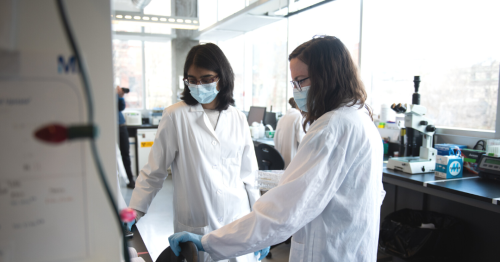
Win4Science’s caregiver travel grants help women scientists flourish
Responsibility for the caregiving of children, an elderly family member, and/or family members with an illness or disability falls overwhelmingly onto women in Canada. Recent data from Statistics...
- Read more about Win4Science’s caregiver travel grants help women scientists flourish

Meet Claude Bhérer, a McGill Professor who is using population genetics research for the treatment of rare diseases
Claude Bhérer, PhD, an Assistant Professor in the Department of Human Genetics at the School of Biomedical Sciences, is fusing her passion for population genetics and evolutionary biology with her...
- Read more about Meet Claude Bhérer, a McGill Professor who is using population genetics research for the treatment of rare diseases

Professor emerita Dusica Maysinger talks about the future of neuromedicine
Dusica Maysinger, PhD, Professor Emerita in the Department of Pharmacology & Therapeutics, reflects on her journey to Canada and McGill, her research on nanotechnology and her thoughts on the...
- Read more about Professor emerita Dusica Maysinger talks about the future of neuromedicine

New interdisciplinary seminar series cross-cuts the biomedical sciences
Following the social solitary confinement caused by COVID-19, Judith Mandl, PhD, Associate Professor in the Department of Physiology, and her colleague Irah King, PhD, Associate Professor in the...
- Read more about New interdisciplinary seminar series cross-cuts the biomedical sciences
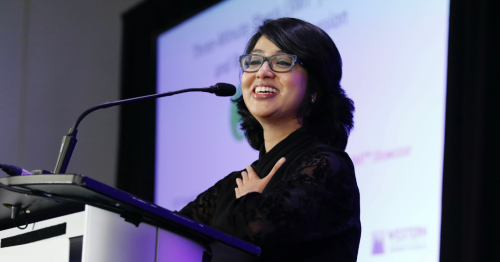
Meet Atia Amin, a McGill PhD candidate who is setting the bar high
Atia Amin, a PhD candidate in the Langlais Lab at the Department of Human Genetics and trainee at the Victor Phillip Dahdaleh Institute of Genomic Medicine, is a budding changemaker and an engine...
- Read more about Meet Atia Amin, a McGill PhD candidate who is setting the bar high
Land Acknowledgement
McGill University is on land which has long served as a site of meeting and exchange amongst Indigenous peoples, including the Haudenosaunee and Anishinabeg nations. We acknowledge and thank the diverse Indigenous peoples whose presence marks this territory on which peoples of the world now gather. Learn More
Department and University Information
School of biomedical sciences.

- Anatomy and Cell Biology
- Biochemistry
- Biomedical Engineering
- Human Genetics
- Microbiology & Immunology
- Pharmacology and Therapeutics
- Rosalind and Morris Goodman Cancer Institute
- Victor Phillip Dahdaleh Institute of Genomic Medicine
- Undergraduate and Graduate Programs
- Research Centres
- Our Core Platforms
- Summer Research Program
- Our Words Matter Initiative
- Governance Team
- Health e-News
- A-Z Directory
- Campus Maps
- Faculties and Schools
- International
- People and Departments
- Become A Student
- Give to Memorial
- Faculty & Staff
- Online Learning
- Self Service
- Other MUN Login Services
Division of BioMedical Sciences | Faculty of Medicine
- Programs of Study
- Bioscience of Health and Disease
Programs of Study - Bioscience of Health and Disease The Bioscience of Health Disease Research Group offers a comprehensive thesis based graduate program leading to the M.Sc. and Ph.D. degrees. The group is made up of 10 core scientists from the Division of BioMedical Sciences, Faculty of Medicine. The research interests of the members are in the Molecular and Cellular Biology of health and diseases and offer graduate students the opportunity to gain strong research skills and experience. Fundamental cell and molecular biological questions are addressed, with investigative approaches focusing on cancer biology and genomics, cellular growth and differentiation mechanisms, developmental biology, skeletal biology and mineral metabolism, stem cell biology, visual science and, biomedical imaging and spectroscopy. Colleagues from the Division of Community Health, clinicians, clinician scientists, and our forensic scientist bring a great deal of experience and interest in, oncology, clinical trials, forensic anthropology, endocrinology and imaging diagnosis and participate in courses offered by the Bioscience of Health and Disease research group.
Training new scientists in these highly specialized fields is an extremely important part of our work. One of our initiatives is an endowment fund targeted solely to funding trainee awards.
Please consider donating to the “ Bioscience of Health and Disease Graduate Training Program Endowment Fund” to support our next generation of scientists studying health and disease here . (Under designation, choose “other” then enter “Bioscience of Health and Disease Graduate Training Program Endowment Fund” in the dropdown box). Admission requirements Candidates must first identify and be accepted by a faculty supervisor in order to commence the Bioscience of Health and Disease program. Candidates admitted to the M.Sc. program must have, at least, a bachelor of Science degree with a second class standing. Students entering the Ph.D. program must have completed M.Sc. program equivalent requirements. Applicants are reminded that any applicant files for which there is no commitment from a supervisor or incomplete files will be closed by the Office of Research and Graduate Studies after one year. A supervisory committee will be chosen in consultation with the supervisor. For each student, the supervisory committee meets on an annual basis to guide research and academic progress. The specific topic for research is selected by the student and the supervisor in consultation with the supervisory committee. All students are required to attend, for credit, and participate in the Bioscience of Health and Disease Research Seminars (Medicine courses 6400-6403 or 6410-6413) for a minimum of four semesters. One other graduate course selected from the list below is required for M.Sc. students and recommended for Ph.D. students. These are minimum requirements; other courses may also be required in individual cases. Ph.D. program students are expected take the comprehensive examination before the end of the seventh semester according to the General Regulations governing graduate studies at Memorial. The comprehensive exam will consist of a written and an oral component. The specific areas to be examined will be chosen by an examination committee in consultation with the student's supervisor. Courses All the courses listed below have as a prerequisite, successful completion of a B.Sc. Medicine 6400, 6401, 6402, 6403 -- Bioscience of Health and Disease Seminars for M.Sc. Students Medicine 6410, 6411, 6412, 6413 -- Bioscience of Health and Disease for Ph.D. Students The Bioscience of Health and Disease Research Group holds a weekly seminar series (corresponding to Medicine 6400-6403 or 6410-6413 courses) during both fall and winter semesters. These sessions are devoted to, but not limited to, special topic presentation of current literature related to the molecular and cellular biology of health and diseases, or ongoing research and technical workshops. Both faculty and graduate students will lead a discussion on issues of importance to any aspect of bioscience of health and disease research, and offer student both exposure to a broad selection of research-related issues, and experience in oral presentations. Registration and participation in this course for four (4) semesters (i.e. students must register in four semesters in any order) is required of all students. Medicine 6578 and 6579 -- Human Gross Anatomy I & II (New courses soon to be offered) These courses provide advanced graduate students with in-depth anatomical training and teaching preparation for future instruction in the anatomical sciences. The content is divided into two sequential courses – Human Gross Anatomy I (Fall) and Human Gross Anatomy II (Winter & Spring), with two primary components comprising the courses: lectures and hands-on laboratories. The laboratories provide students with the best opportunity to have practical experience with the anatomy by using prosected cadavers, wet and plastinated specimens, bones, diagrams, virtual resources (e.g., Anatomage table), and models to understand the physical arrangement of the structures discussed in lecture. Objectives include 1) gaining knowledge of human anatomical structures, their location in the body, and their spatial/functional relationships, 2) developing an appreciation for variation in anatomical structures among humans, 3) learning the fine dissection skills necessary to identify, isolate, and preserve the delicate structures encountered throughout the course, 4) learning how to integrate this anatomical knowledge with clinical and research applications, and 5) gaining experience preparing anatomy-related teaching materials including lectures and cadaver presentations. Medicine 6580 -- Molecular Biology of Cancer This a hybrid learner course taught by both basic science and clinical Faculty. Learners include Discipline of Oncology postgraduate trainees, Medicine graduate trainees or trainees in other graduate programs. Subjects covered but not necessarily limited to are: The etiology and biology of cancer including DNA structure and stability (mutations and cytogenetic aberrations versus repair), regulation of cell cycle progression and cell growth through gene expression (growth factor signaling pathways/oncogenes, tumor suppressors and cell death), role of stem cells and differentiation in cancer, metastasis, immunological aspects and cellular markers of cancer; cancer treatments as well as cancer clinical trial design. Medicine 6590 -- Imaging and spectroscopy for biomedical science This course is intended for those who require grounding in non-invasive measurement using electromagnetic (e.g. x-ray, NMR/MRI, gamma) and acoustic (US) radiation. The course will explore the principles of acquiring data and some of the features and limitations of the data. Medicine 6591 -- Current Approaches to Biomedical Research (cross-listed as, Biology 6591) The purpose of this course is to explore current methods used in molecular medicine and to apply this information through presentations and assignments. A team of instructors will lead students through the basics of informatics, imaging, gene expression and protein analysis, sequencing technologies, cellular and animal models for disease modeling, cellular signaling and genome editing techniques. Visiting Speaker Series Bioscience of Health and Disease Research Speaker Program -- Throughout the year, our research group invites world class researchers from Canada and elsewhere to present their work in order to promote scientific exchange and to inform students and faculty of ongoing work in other institutions. This forum may, from time to time, be included in the yearly BioMedicine Symposium held by the BioMedical Sciences Division of the Faculty of Medicine. Awards Baseline University Fellowships -- University fellowships are awarded on a competitive basis to outstanding full-time students by the School of Graduate Studies upon the recommendation of the Faculty of Medicine. Currently, M.Sc. fellowships are valued at $9,000 and Ph.D. fellowships are valued at $11,000 per annum. These fellowships are supplemented by the supervisor funds for a total minimum stipend of $14,500 for M.Sc. students and $17,500 for Ph.D. students. Faculty of Medicine Awards Internal and External Graduate Studies Awards Current Program Awards Mary Pater and Mary O’Neill Awards for excellence in Bioscience of Health and Disease Research -- Awarded to the graduate students enrolled in our program who gives the best presentations during our annual research forum. The presenters are judged both on their research results and quality of their presentation. Teaching Assistantship
Graduate students can gain teaching experience by applying for remunerated positions of teaching assistant for the Anatomy and Vision laboratories part of the undergraduate medical education programs.
Program contact Inquiries concerning the Bioscience of Health and Disease Program may be directed to: Barbara Hynes, Academic Program Assistant Phone: (709) 864-4963; Email: [email protected] Fax (709) 864-6007 Participating Faculty
- Andronowski, JM. , Ph.D.: Bone adaptation, quality, and fragility; High-resolution 3D bone imaging (e.g., µCT, SRµCT); Forensic anthropological applications of bone histology.
- Belbin, Thomas , Ph.D.: Apoptosis and Cancer, Bioinformatics, Cancer Diagnosis and Detection, Cell Signaling and Cancer, Genomics, Head and Neck Cancer.
- Church, J. , Ph.D.: Mechanisms of EGF-medicated signal transduction; EGF-mediated growth inhibition; Breast cancer and communications research.
- Dore, Jules , Ph.D: Regulation of Cell Growth.
- Dorward, Ann M ., Ph.D.: Mouse models of reproductive disorders and cancer; genetic and epigenetic regulation.
- Esseltine, JL., Ph.D.: Cell-cell communication in human stem cells; modelling NL genetic diseases using stem cells.
- Gendron, Robert , Ph.D.: Research on health and disease using the vertebrate eye as a model system.
- Kendall, Edward , Ph.D.: Biomedical imaging and spectroscopy.
- Kao, Kenneth R ., Ph.D.: Effect of sex hormone modulation on the initiation of prostate cancer.
- Kovacs, Christopher , M.D.: Regulation of mineral and bone metabolism during pregnancy, lactation, and fetal development.
- Leitges, Michael , Ph.D.: Protein kinase C and D signalling during tumorigenesis and beyond.
- Paradis, H. , Ph.D.: Ocular Health and Aging.
- Neurosciences
- Immunology and Infectious Diseases
- Cardiovascular and Renal Sciences
- Human Genetics and Genomics
Related Content

Biomedical Science
Program description.
Biomedical Science is an interdisciplinary program that focuses on the fundamentals of human structure and function, as well as those of other animals. The first two years provide a background in anatomy and psychology in addition to more in-depth knowledge in basic sciences like biology, biochemistry, chemistry and mathematics. After year two, you can choose to combine additional courses in biology and biochemistry with an array of optional courses and obtain a minor in one of many arts or social sciences programs, or you can choose an option in the life sciences, such as neuroscience, cellular and molecular medicine, bioanalytical science, biostatistics and medicinal chemistry.
In addition, the Research Focus is an immersive research experience offered from the third year for students who may be considering a career in research. Upon graduation, students are prepared for more advanced training in research or for admission into one of the professional programs in human health

Options and suggested course sequences
Enhance with a microprogram.
- Science Entrepreneurship
- Science Policy
- Science Communication
- Science Education
The Microprogram in Science Entrepreneurship provides an introduction to business management, new venture creation and entrepreneurship that will allow you to take a new scientific idea to market. It also includes a course on creativity and innovation, and a fourth year capstone course specifically dealing with commercializing a scientific product.
Microprogram in Science Entrepreneurship program requirements
The University of Ottawa is privileged to be in the heart of the nation’s capital, where science policy is made. The Science Policy option is a nine-unit (three course) option that can be incorporated into your Honours BSc program. It provides an introduction to public administration and public policy analysis. The fourth year capstone course deals with the importance of science in evidence-based decision making and sound policy making.
Microprogram in Science Policy program requirements
A new microprogram in Science Communication consisting of five courses (15 units) will offer undergraduate students the opportunity to develop and refine their written, oral, and visual science communication skills.
Scientists are increasingly expected to engage directly with the public to disseminate scientific information of value to society and to inform citizens, allowing them to make evidence-based decisions. However, skills in specialized scientific communication do not translate well during engagements with the public about science (termed science communication ). Given that most of our undergraduate science students do not continue to undertake higher graduate studies upon completion of their BSc degrees, these future scientists in society will need skills in generalized science communication in order to effectively engage their public peers in meaningful communications about science during their future careers. For those students destined for careers in academia, this early exposure to science communication will allow them to have an extended reach for their research results, as well as a strong voice in the democratic process of societal discourse.
Microprogram in Science Communication program requirements
If you are interested in a career related to teaching or the design and delivery of educational programming, this microprogram will offer you the opportunity to acquire a strong foundation in Science Education. The courses can be counted as your elective courses at the 3000 and 4000 level in your undergraduate program. The combination of these courses is intended to develop your understanding and application of the scholarship of teaching and learning to your own scientific discipline.
Microprogram in Science Education program overview
Program learning outcomes
By the end of this program, students will be able to:
Depth and Breadth of Knowledge
- Explain the chemical and physical underpinnings of life;
- Explain and integrate the key concepts of living systems such as biological diversity and its evolution, cellular organization, transmission of biological information, structure-function relationships, and functioning of ecological systems;
- Apply the scientific method including formulating a hypothesis, designing studies, and drawing conclusions.
Knowledge of methodologies
- Demonstrate a set of core field and laboratory-based observations, measurements and sampling techniques;
- Identify and depict patterns in biological data;
- Acquire, process and analyze data using appropriate bibliographic, mathematical and statistical techniques.
Application of knowledge
- Acquire and collate the information and data relevant to a given biological question and objectively interpret them to draw an informed conclusion;
- Use key concepts and methodologies in applied situations ranging from advanced laboratory and field courses to work and research settings.
Communication skills
- Develop and defend logical, coherent arguments;
- Disseminate biological information in written and oral format to scientific and non-scientific audiences.
Awareness of limits of knowledge
- Evaluate recent advances in biological knowledge and recognize the limits of the scientific process.
Autonomy and professional capacity
- Demonstrate professional work habits and ethical conduct when working individually or as part of a team.
Research focus
The Research Focus provides an immersive experience in which students join a research lab to carry out research during their final two academic years, honing their technical skills while learning how to develop research ideas, design experiments, and analyze and communicate scientific data. For students with inquiring minds, this program will fuel your passion for research by allowing you to delve deeply into your areas of interest. By the end of the Research Focus, you will be prepared to hit the ground running in a graduate research degree, or you will be able to apply your research, analysis and communication skills to furthering your career in other directions.

Laboratories
- Teaching laboratories
- Research laboratories
- 10 state-of-the-art teaching laboratories
- Traditional and virtual learning environment
- Research-grade microscopes and digital imaging systems
- Networked computers
- Microscopy techniques and the use of images as biological data
- Testing of biological concepts using an experimental approach
- Computer simulations of populations
- Animal and plant physiology equipment
Research at the undergraduate level
More information.
CO-OP programs keyboard_arrow_right

What can I do with my studies? keyboard_arrow_right

Campus tours and admissions events keyboard_arrow_right

Graduate studies keyboard_arrow_right

79 PhD-Biomedical-science positions in Canada
Filtered by.
- PhD-Biomedical-science
Refine Your Search
- Last-3-days 1
- Last-7-days 2
- Last-30-days 7
- Research Job 19
- Scholarship 16
- Fellowship 11
- Postdoctoral 8
- Postgraduate 6
- University of British Columbia 37
- McGill University 20
- Canadian Association for Neuroscience 4
- The University of British Columbia (UBC) 3
- University of Alberta 3
- University of Saskatchewan 3
- Ryerson University 2
- University of Toronto 2
- McGill University - Faculty of Medicine and Health Sciences 1
- Natural Sciences and Engineering Research Council of Canada 1
- University of Victoria 1
- University of Windsor, Office of Research and Innovation 1
- Université Laval 1
- Medical Sciences 37
- Computer Science 9
- Economics 2
- Linguistics 1
Collaborative Postdoctoral Position - Medical Imaging AI
authorship efforts for organizing and publishing the research outcomes as white-papers, scientific abstracts and journal articles. Job Qualifications: PhD in Computer Science , Biomedical Engineering, or a
Canada Research Chair - Environmental and Public Health Genomics - Tier 2 Tenure-Track Position
, School of the Environment at the rank of Assistant or Associate Professor (tenure-track) with an opportunity for cross-appointment to the Department of Biomedical Sciences . The Tier 2 CRC program is
Master's or PhD position in neurobiology and tissue engineering
Psychiatrie et Neurosciences PHD Country: Canada Requirements Specific Requirements Your profile: Obtained a Bachelor’s or a Master’s degree in Neurosciences, Cell Biology, Biomedical Sciences or related area
Research Associate - Lead Scientist, iPS Cell Manipulation
2 May 2024 Job Information Organisation/Company The University of British Columbia (UBC) Research Field Engineering » Biomedical engineering Researcher Profile Leading Researcher (R4) Established
Postdoctoral Researcher (Dr. Cuello's Laboratory)
candidates should have a PhD in relevant fields and have a strong background in fundamental aspects of neuroscience, neurochemistry, immunohistochemistry, cellular and molecular biology, and a serious interest
Lab Helper B
: Biomedical Engineering Position Summary: Learn and Assist in cell culture Assist in the characterization of cells Learn to make Nanoparticles Learn to isolate EVs Assist the PhD students with their in vitro
Academic Job Category Faculty Non Bargaining Job Title Research Associate - Lead Scientist, iPS Cell Manipulation Department Zandstra Laboratory | School of Biomedical Engineering | Faculty
3-Year Term, Non-Tenure Track, Lecturer Position in Veterinary Biomedical Sciences
Applications are invited from qualified individuals for a 3-year term non-tenure-track lecturer position within the Department of Veterinary Biomedical Sciences https://wcvm.usask.ca/departments/bio
Graduate Student Position, Molecular Genetics (MSc or PhD )
of Veterinary Biomedical Science (https://grad.usask.ca/programs/veterinary- biomedical -sciences.php ) or the Department of Biochemistry, Microbiology, and Immunology (https://medicine.usask.ca/students/graduate
Faculty Member, Biostatistics in Population, Public, Clinical Health, Health Services Research
of Medicine. Investigators across the clinical, biomedical , and population health sciences can access support for study design, sample size/power calculation, data management, analysis, and manuscript revision
Searches related to PhD Biomedical science
- medical sciences
- phd immunology
- biomedical phd
- phd genetics
- microbiology
- biomedical engineering phd
- biomedical science

Biomedical Beat Blog – National Institute of General Medical Sciences
Follow the process of discovery
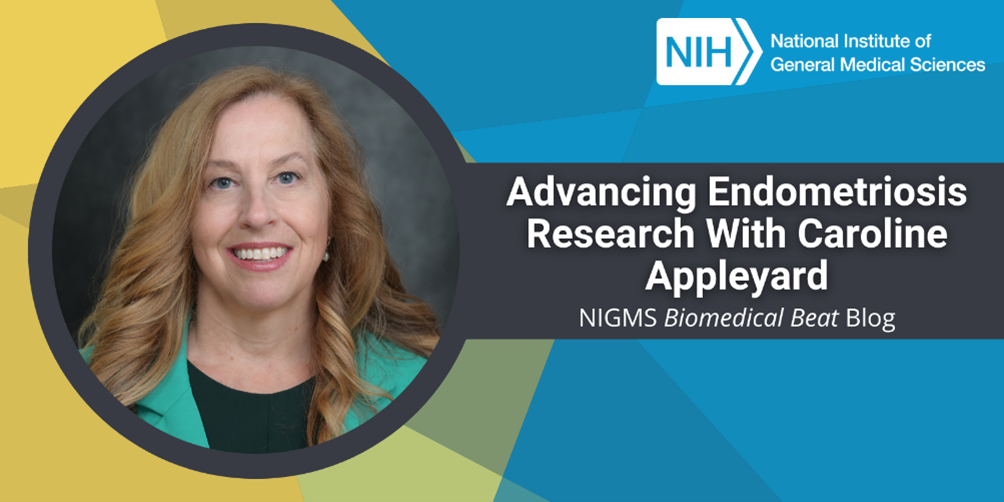
Search this blog
Advancing endometriosis research with caroline appleyard.
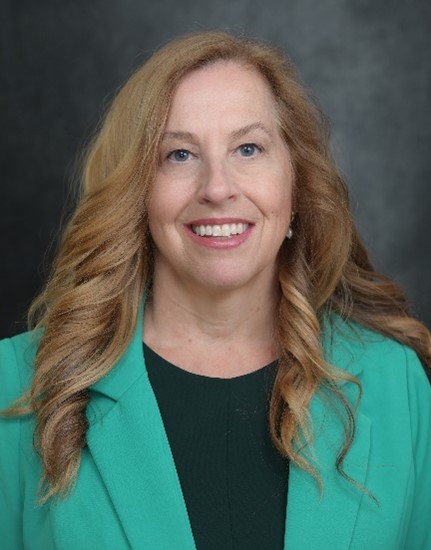
The job opening at Ponce Health Sciences University (PHSU) in Ponce, Puerto Rico—home to great coral reefs—seemed like a perfect fit for Caroline B. Appleyard, Ph.D., given that scuba diving was one of her favorite hobbies. She only intended to stay for a short time, but now, more than 25 years later, Dr. Appleyard is a professor of physiology and pharmacology and program director of the NIGMS-funded Graduate Research Training Initiative for Student Enhancement (G-RISE) at PHSU.
An Interest in Inflammation
Growing up in Scotland, Dr. Appleyard was captivated by a children’s show with science demonstrations that helped kids and teens understand the world around them. She enjoyed studying biology and chemistry , and in high school, joined a lab at a local university that studied pharmacology. Her lab project studying the medicine aspirin ultimately solidified her interest in a career in research.
From there, Dr. Appleyard started her undergraduate education in pharmacology at the University of Edinburgh in Scotland. As part of her senior project, she worked for one semester at the Royal Infirmary in Edinburgh in the blood transfusion unit, where she learned more about the components of blood, including immune system cells . This experience led to a new interest in inflammation , especially how it goes awry.
“What intrigues me about inflammation is how it can be a double-edged sword: It’s a good thing because it protects us from infection or injury, but it can cause problems when it gets out of control,” says Dr. Appleyard. “Despite how much we understand about inflammation, the chronic diseases it causes still plague patients, and there are many unanswered questions about why we can’t control it.”
Pursuing this interest, Dr. Appleyard entered a Ph.D. program at the University of Southampton in the United Kingdom to study clinical pharmacology. There, she researched how gastrointestinal inflammation relates to diseases like ulcerative colitis (UC) .
Two postdoctoral positions followed Dr. Appleyard’s Ph.D. studies. At the University of Calgary in Canada, under the mentorship of John Wallace, Ph.D. , she helped develop a research organism able to mimic the chronic intestinal symptoms of human UC. She then studied the influence of the nervous system and blood flow on gastrointestinal inflammation through the gut-brain axis—a communication channel between the gut and brain—at the University of South Dakota in Vermillion. This experience in neuroscience directly impacted Dr. Appleyard’s research interests as she started her own lab at PHSU.
Examining Endometriosis

Through conversations with her colleagues at PHSU-Ponce Research Institute, Dr. Appleyard realized there were similarities between the inflammation in UC and in endometriosis , a disease in which lesions of tissue similar to a uterus’ lining grow in other places in the body. Patients with endometriosis experience symptoms such as pelvic pain, strong menstrual cramps, and gastrointestinal upset. In addition, they’re often under a lot of stress that stems from symptom management, missed work or school, and the infertility endometriosis causes. Stress can worsen the symptoms of many chronic diseases, including UC, but researchers didn’t know if that was true in endometriosis. Dr. Appleyard’s lab set out to help answer this question by studying rats that develop endometriosis.
“We showed that stress—either before or after the disease course began—exacerbated endometriosis in the rats. Our next question was whether we could block that connection, either with medicine or without,” Dr. Appleyard explains. Exercise and mindfulness techniques, such as deep breathing, are known to be stress-relieving activities, so Dr. Appleyard increased the rats’ exercise regimens. She found that additional voluntary exercise before or after endometriosis onset reduced the size of the lesions that grew, the levels of inflammation, and symptom severity.
“Of course, this is difficult to translate to human patients. Given the symptoms that people with endometriosis experience, patients may not want to—or can’t—exercise. Instead, as a first step, we tested the effect of mindfulness techniques on pain, mental health, and quality of life in patients with endometriosis,” Dr. Appleyard says. The studies saw decreases in anxiety, stress, and depressive symptoms in patients who adopted the techniques.
Moving forward, the lab is working to understand the cellular mechanisms controlling the connection between stress, exercise, and endometriosis. Nerve cells in the gut, called enteric glial cells (EGCs), play a role in controlling inflammation in the intestinal tract by producing anti-inflammatory molecules . Dr. Appleyard’s lab has shown that exercise can increase the production and activity of these anti-inflammatory molecules in addition to reducing lesion size and symptom severity. She plans to further investigate the role of EGCs in endometriosis with the goal of identifying specific cell types, receptors , or signaling molecules involved in this process that future medicines could target to treat or prevent the disease.
G-RISE at PHSU
One aspect that Dr. Appleyard likes most about her job is the mix of research, teaching, and student training she’s involved in, including her role as program director of G-RISE at PHSU . The goal of G-RISE is to strengthen research training environments and promote broad participation in the biomedical research workforce by expanding the pool of well-trained scientists earning a Ph.D.
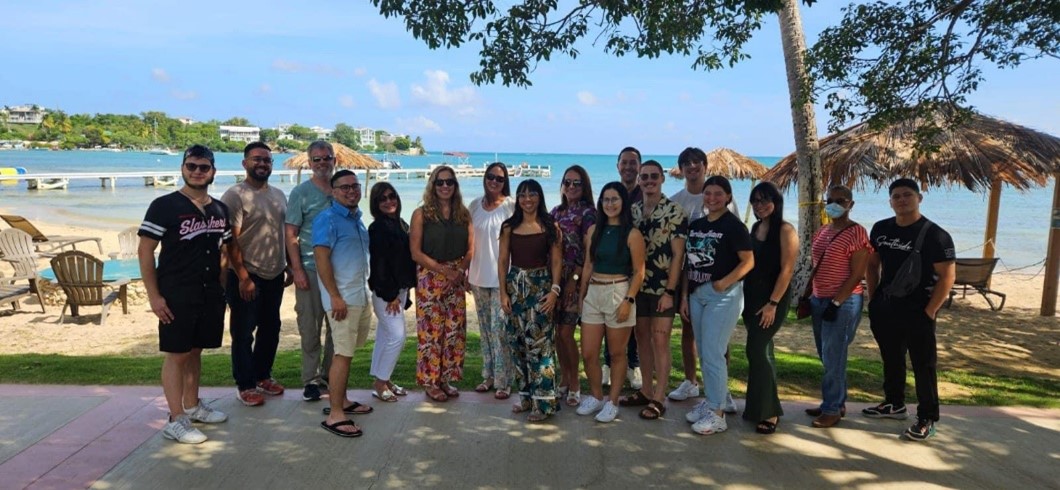
To do this, G-RISE leaders at PHSU provide their graduate students with the professional development and career-building skills they need to stay on track for graduation and for their careers ahead. Through peer mentoring and presentations from visiting scholars and previous G-RISE trainees, current trainees get exposure to research that scientists are conducting around the world and an introduction to the range of career paths they can take after graduate school.
“G-RISE is really my biggest accomplishment. It’s so rewarding to see that our previous trainees have gone on to successful careers in science,” says Dr. Appleyard. In 2017, she was awarded the inaugural Clifford Barger Underrepresented Minority Mentorship Award from the American Physiological Society in part for her impact on the lives of PHSU students since G-RISE’s 2008 inception. “Knowing that my work has such an impact on other people gives me a sense of happiness and pride,” she says.
Dr. Appleyard’s research is supported by NIGMS through grant R16GM149365 . G-RISE at PHSU is supported by NIGMS through grant T32GM144896 (formerly R25GM082406). Dr. Appleyard’s educational and mentoring activities are also supported by the National Cancer Institute through grant U54CA163071 , and her translational pharmacological work is supported by the Eunice Kennedy Shriver National Institute of Child Health and Human Development through grant R41HD109055 .
Other Posts You May Like

Submit a Comment Cancel reply
Please note: Comment moderation is enabled and may delay your comment. There is no need to resubmit your comment.
Subscribe to Biomedical Beat
Get our latest blog posts delivered straight to your inbox! Sign Up Here
Get the latest news and stories from Tufts delivered right to your inbox.
Most popular.
- Activism & Social Justice
- Animal Health & Medicine
- Arts & Humanities
- Business & Economics
- Campus Life
- Climate & Sustainability
- Food & Nutrition
- Global Affairs
- Points of View
- Politics & Voting
- Science & Technology
- Alzheimer’s Disease
- Artificial Intelligence
- Biomedical Science
- Cellular Agriculture
- Cognitive Science
- Computer Science
- Cybersecurity
- Entrepreneurship
- Farming & Agriculture
- Film & Media
- Health Care
- Heart Disease
- Humanitarian Aid
- Immigration
- Infectious Disease
- Life Science
- Lyme Disease
- Mental Health
- Neuroscience
- Oral Health
- Performing Arts
- Public Health
- University News
- Urban Planning
- Visual Arts
- Youth Voting
- Cummings School of Veterinary Medicine
- Friedman School of Nutrition Science and Policy
- The Fletcher School
- Graduate School of Arts and Sciences
- Graduate School of Biomedical Sciences
- Jean Mayer USDA Human Nutrition Research Center on Aging
- Jonathan M. Tisch College of Civic Life
- School of Arts and Sciences
- School of Dental Medicine
- School of Engineering
- School of Medicine
- School of the Museum of Fine Arts
- University College
- Australia & Oceania
- Canada, Mexico, & Caribbean
- Central & South America
- Middle East

Sayako Hiroi, "Why can't we be what we are for ourselves?," acrylic on canvas, 2023
Art That Is Not to Be Passed By
2024 MFA Thesis Exhibitions feature work from 27 graduating students
Printmaker Nina Montejano is interested in “depictions of architectural material surfaces that exist in places we pass by, through, or over,” she writes. For her thesis project, she reproduced the very floor that exhibit-goers tread upon. It took the form of a large screen print of a section of tile within the Aidekman Arts Center on the Medford/Somerville campus.

Quincey Spagnoletti, “The Room at the Top of the Stairs, No. 1,” 2022, archival inkjet print
“Creating these highly detailed copies helps us reconsider their originals,” Montejano explains in her artist statement.
She accompanies the piece with a thick binder of work orders for the building, dating back to 2011. The collected requests for replacement of stained or missing ceiling tiles, securing of a railing in the sculpture court, and countless other repairs read like a biography of this space that has been the backdrop for so many kinds of art over the years.
Montejano is just one of 27 graduating Master of Fine Arts students from SMFA at Tufts whose thesis works are now on display at the Tufts University Art Galleries at Aidekman Arts Center. The exhibit, Pulling Teeth and Jumping Rope , curated by Danni Shen, is free and open to the public.
As the exhibit’s description explains, many of the works reflect upon personal memory, through “dreamscapes, portals, wormholes, holes, and psychological landscapes rendered through a variety of mediums.”

Photographer Niko Krivanek, for example, presents black and white images of the natural environments surrounding correctional institutions—alongside a color portrait of their incarcerated mother, a photo it took years to arrange to take.
“To be able to see my mother through the viewfinder was the first time I’ve seen her beyond the walls of incarceration, to see her potential life after her release,” they write in their artist statement.
Many of the graduates took inspiration from their identities.

Niko Krivanek, from the series “Natural Life,” silver gelatin print, 2024
The Cuban American artist W.O.V. explores taboo and queer subjects such as online pornography, fatphobia, camp, labor, and excess through painting and papermaking.
Sayako Hiroi challenges Japanese female stereotypes in her paintings, which are marked by contoured fragmented bodies with undulated forms and textures; their vivid colors, she writes, draw inspiration from the rich palette of Japanese tradition.
Meanwhile, Rachel A. Lee uses iconography indicative of the American South and objects associated with Korean culture, such as rounded white ceramic “moon jars,” to create a juxtaposed environment that is representative of her multi-racial identity.
Pulling Teeth and Jumping Rope is on view through Sunday, May 19, at the not-to-be-passed-by Aidekman Arts Center on the Medford/Somerville campus.

Vintage Letterpress Offers Opportunities to Learn “through the Hands”

Kaylee Rose’s Everywhere Art

Rare Books as Tangible History
- Skip to main content

- All countries /
- North America /
- Applied and Pure Sciences /
- Biomedical Sciences
27 Universities in Canada offering Biomedical Sciences degrees and courses
More Information
Are you looking for Biomedical Sciences courses? Here you can find course providers offering full-time, part-time, online or distance learning options.
You've reached your limit of 10 Favourites
Brock University
Trent university, ontario tech university.
THE World Ranking: 601
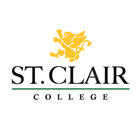
St. Clair College
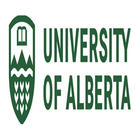
University of Alberta
THE World Ranking: 109
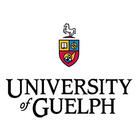
University of Guelph
THE World Ranking: 401

University of Northern British Columbia
THE World Ranking: 801
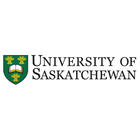
University of Saskatchewan
THE World Ranking: 351
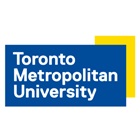
Toronto Metropolitan University
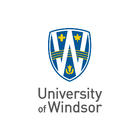
University of Windsor
THE World Ranking: 501
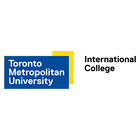
Toronto Metropolitan University International College
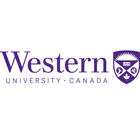
Western University (Ontario)
THE World Ranking: 201
- Biomedical Physics
- Biomedical Technology
- Medical Biochemistry
- Medical Microbiology
- British Columbia
- Nova Scotia
- Saskatchewan
- Study level:
- All study levels
- Postgraduate
- Undergraduate
- Career based/Vocational
- Study mode:
- Online/Distance
- Cross-border
Filter your results
Tell us about you.
- Nationality Select country Select country
- My current qualification is from Select country Yes No Select country Select country
- Current qualification {0} is not applicable for the study level you selected below. Qualification Qualification
- Grade type (only one grade type for your qualification) Grade type Grade type
- My score (current or expected) Please select Please select Please select Please select Please select Please select
Tell us your preferences
- Subject Biomedical Sciences
Qualification
- Destination Canada
- Study options
- Annual tuition fees
Subject areas
Destination.
- The UConn School of Business has grown to become one of the most comprehensive business schools in the country.
- NEW: Want to study in your home country for a foreign qualification? Find out more about cross-border study!

30 years of (re)productive biology: a symposium honoring professor Martin M. Matzuk, MD, PhD
- Article contents
- Figures & tables
- Supplementary Data
T Rajendra Kumar, Kathleen H Burns, Wei Yan, 30 years of (re)productive biology: a symposium honoring professor Martin M. Matzuk, MD, PhD, Biology of Reproduction , Volume 110, Issue 5, May 2024, Pages 852–853, https://doi.org/10.1093/biolre/ioae051
- Permissions Icon Permissions
Martin Matzuk, MD, PhD, is a professor and the Stuart A. Wallace Chair of the Department of Pathology and Immunology at the Baylor College of Medicine, Houston, TX, USA. During the span of over 30 years at a single institution, he has made seminal contributions to various areas of reproductive biology research, including systematically deciphering the developmental roles of TGF-β growth factor family members (inhibins, activins, activin receptor-2, follistatin, GDF9, BMPs, and SMADs) in normal physiology and pathology of ovarian, testicular, and uterine functions. In the last decade, he developed a comprehensive drug development center at Baylor College of Medicine embarking on rapid target identification using DNA-encoded chemistry and in silico screening. In addition to continuing basic research, his team is now mostly focusing on the development of highly specific drugs for male contraception, endometriosis and ovarian cancer, and many other diseases.
Dr Matzuk received numerous honors and awards, including the Elected Member of the National Academy of Sciences, the Carl Hartman Award, the highest award conferred by the SSR, and, more recently, The Texas State Hill Prize. He trained numerous undergraduate, graduate, clinical, and postdoctoral fellows who have made distinguished careers in basic science and clinical medicine. Many of his former trainees and some of his collaborators met in person in April 2023 and felicitated his achievements in a day-long scientific symposium organized by the three of us (TRK, KHB, and WY) at Baylor College of Medicine, Houston, TX ( Figure 1).
Email alerts
Citing articles via.
- Recommend to Your Librarian
- Advertising and Corporate Services
Affiliations
- Online ISSN 1529-7268
- Print ISSN 0006-3363
- Copyright © 2024 Society for the Study of Reproduction
- About Oxford Academic
- Publish journals with us
- University press partners
- What we publish
- New features
- Open access
- Institutional account management
- Rights and permissions
- Get help with access
- Accessibility
- Advertising
- Media enquiries
- Oxford University Press
- Oxford Languages
- University of Oxford
Oxford University Press is a department of the University of Oxford. It furthers the University's objective of excellence in research, scholarship, and education by publishing worldwide
- Copyright © 2024 Oxford University Press
- Cookie settings
- Cookie policy
- Privacy policy
- Legal notice
This Feature Is Available To Subscribers Only
Sign In or Create an Account
This PDF is available to Subscribers Only
For full access to this pdf, sign in to an existing account, or purchase an annual subscription.

Informing, inspiring, and advancing global innovation to support a healthy, sustainable future
For immediate release, brain connectivity appoints new editor-in-chief, steven laureys, md, phd, fean.
Contact: Kathryn Ryan 914-740-2250 [email protected]
Mary Ann Liebert, Inc. 140 Huguenot Street New Rochelle, NY 10801 (914) 740-2100 or (800) M-LIEBERT Fax (914) 740-2101 www.liebertpub.com
New Rochelle, NY, May 7, 2024 —Mary Ann Liebert, Inc., is pleased that Steven Laureys, MD, PhD, FEAN , has been appointed the new Editor-in-Chief of the journal Brain Connectivity . Dr. Laureys is replacing Paul Edison, MD, PhD, FRCP , as Editor-in-Chief. Brain Connectivity provides authoritative, peer-reviewed, and original investigations in the areas of neuroscience, neurology, physics, biophysics, computer science, neuroinformatics, developmental biology, genetics, molecular biology, psychiatry, pharmacology, anesthesiology, cell biology, and brain anatomy relevant to the field of brain connectivity. The journal delivers groundbreaking research on all aspects of systems and network-level brain connectivity and brain mapping research. “Dr. Laureys's appointment as Editor-in-Chief of Brain Connectivity opens great opportunities and an exciting new phase for the journal. His broad visionary approach will ignite fresh perspectives and support curiosity within the field of neuroscience, fostering a deeper understanding of the intricate complexities of neural connections,” said Dr. Nicholas Schiff , Professor of Neuroscience, Brain and Mind Research Institute, Weill Cornell Medicine in New York, New York. “I'm eagerly anticipating the opportunity to lead Brain Connectivity as Editor-in-Chief, with a focus on curating special issues around related content and emerging topics. My vision also includes selecting captivating covers featuring scientific illustrations or photos that visually depict the intricate complexities of neural connections, captivating our readers and sparking curiosity in the field of neuroscience,” said Dr. Laureys . Steven Laureys is a neurologist, author and keynote speaker, recognized for his expertise in neuroplasticity, neuromodulation, consciousness and cognition. He is Chairholder of the Canada Excellence Research Chair in Neuroplasticity at Laval University, CERVO Brain Research Centre, Canada and Invited Professor at Beth Israel Deaconess Medical Center, Harvard Medical School, Boston. He is Honorary Research Director at the Belgian Fund for Scientific Research and founder of the Coma Science Group and GIGA Consciousness Research Unit at Liège University and of BRAIN-NM NeuroModulation Clinics Antwerp and Amsterdam. He has authored over 500 scientific articles and is one of the most highly cited researchers in his field. Mary Ann Liebert, Inc., would like to thank Dr. Edison for his dedication and service to the journal.
About the Journal Brain Connectivity is an international neuroscience journal dedicated to the publication of innovative research, scientific reviews, and academic communications pertaining to all aspects of anatomical, functional, and causal connections between distinct units within the central nervous system. Tables of content and a free sample issue may be viewed on the Brain Connectivity website. About the Publisher Mary Ann Liebert, Inc., publishers is a global media company dedicated to creating, curating, and delivering impactful peer-reviewed research and authoritative content services to advance the fields of biotechnology and the life sciences, specialized clinical medicine, and public health and policy. For complete information, please visit the Mary Ann Liebert, Inc., publishers website.

IMAGES
VIDEO
COMMENTS
Entry into PhD program after completion of a bachelor's degree (i.e., direct entry): A four-year bachelor's degree in engineering, medicine, dentistry, physical sciences, or biological sciences, or its equivalent, with an average of at least 3.7 on a 4.0 grade point average scale (i.e., A minus) in the final two years of study from a recognized university; or
Queen's University. This page shows a selection of the available PhDs in Canada. If you're interested in studying a Biomedical Science degree in Canada you can view all 7 PhDs. You can also read more about Biomedical Science degrees in general, or about studying in Canada. Many universities and colleges in Canada offer English-taught PhD's degrees.
Graduate study in Biological Sciences puts students on the front lines of discovery. Doctoral students design, conduct and analyze original research; they develop rigorous expertise in everything from foundational theory and the study of evolution to cutting-edge research methodologies as they investigate a broad range of biological problems ranging from the molecular level to the biosphere.
Graduate Program in Biological and Biomedical Engineering Room 316, Duff Medical Building 3775, rue University Montréal, QC H3A 2B4 Canada Map Tel: 514-398-6736 Fax: 514-398-7461 E-mail: [email protected] Report a website issue
from August 15, 2023 to June 1, 2024. Submit your application as soon as possible since space is limited. Application deadline. from February 1, 2024 to September 1, 2024. Application deadline. Start of admission: Application deadline. Start of admission: Offered at the Montréal campus.
Petitions, grades and scheduling. Grad pay. The School of Graduate Studies. Gilmour Hall, Room 212. 1280 Main Street West. Hamilton, Ontario, Canada L8S 4L8. Errors in content on this site should be reported using our online form. Media Production Services is committed to providing websites that are accessible to the widest possible audience.
Canada. Biomedical Communications Program. Web: bmc.med.utoronto.ca Email: [email protected] Telephone: (905) 569-4849. Master of Science in Biomedical Communications University of Toronto Mississauga HSC 308, 3359 Mississauga Road Mississauga, Ontario L5L 1C6 Canada. Graduate Diploma in Health Research
The PhD in Biomedical Engineering consists of coursework and a substantial research component. A minimum of 12 credit hours at the 7000 level or higher is required. Students from engineering backgrounds normally have to take anatomy and physiology. Students from science backgrounds should not enroll in anatomy and physiology.
Find the best PhD programmes in the field of Biomedical Science from top universities in Canada. Check all 7 programmes. ... PhD programmes in Biomedical Science in Canada. Programmes Scholarships. Page 1 | 7 PhDs. Filters 2. 7 PhDs. Sort . Our picks ... (IOP) is a graduate program at University of British Columbia designed to appeal to a broad ...
Biomedical Engineers apply their knowledge in engineering, biology, and medicine to healthcare and medical device industries. Biomedical Engineering is a distinct field that encompasses engineering disciplines, biology, life sciences, medicine, clinical applications, and the improvement of human health. Since 2006, our PhD program has trained students in the fundamentals of Biomedical ...
Program Websites: Master of Biomedical Sciences (MBS) MSc Biomedical Sciences. PhD Biomedical Sciences. Program Contact: Heather Hamilton, Graduate Program Assistant. [email protected]. 519-824-4120 x54780.
The Division of Biomedical Sciences (BMS) in the Faculty of Medicine at the Memorial University of Newfoundland hosts the Bioscience of Health and Disease graduate program, offering students the opportunity to pursue a Doctor of Philosophy (PhD) degree.
The Department of Biological Sciences will be moving to the new Science Complex in the fall of 2019. Discover your new surroundings in photos and video. For more information Become an independent scientist by earning your PhD in Biological Sciences! Prove your ability to develop unique knowledge in a field of your choice. At the doctoral level, you will prepare a thesis making a significant ...
The PhD degree in biomedical engineering is a research-intensive program requiring a minimum of four graduate-level courses and an orally-defended research thesis. Students must first enroll in the biomedical MSc program and then transfer to the PhD program. Courses taken in the MSc program count towards the PhD degree.
Biological Sciences Graduate Student Association (BSGSA) ... Winnipeg, MB R3T 2N2 Canada. [email protected] . Phone: 204-474-9377. Monday to Friday, 8:30 a.m. to 4:30 p.m. Program inquiries. Department of Biological Sciences 212B Biological Sciences Building 50 Sifton Road
The School of Biomedical Sciences (SBMS) was created in April 2020 as part of Project Renaissance, a strategic planning exercise for the Faculty of Medicine and Health Sciences. The School federates all biomedical research and education activities within the Faculty. Our nine constituent units bring together internationally renowned teams in ...
Ph.D. programs in biomedical science generally take 4-5 years to complete, and include core and elective coursework, laboratory rotations and dissertation research. Generally, the first year exposes students to research in biological, bioengineering and biomedical fields to help them identify an area of specialization and dissertation topic.
Programs of Study - Bioscience of Health and Disease The Bioscience of Health Disease Research Group offers a comprehensive thesis based graduate program leading to the M.Sc. and Ph.D. degrees. The group is made up of 10 core scientists from the Division of BioMedical Sciences, Faculty of Medicine. The research interests of the members are in the Molecular and Cellular Biology of health and ...
16 Universities in Canada offering postgraduate Biomedical Sciences degrees and courses. Plan your studies abroad now. ... View 3 Biomedical Sciences courses. Option to study for a qualification from Canada. 225607. Views. 2619. Favourites. ... Graduate Certificates & Diplomas; Masters Degrees; Doctoral Degrees; Study mode: On Campus;
Various options and research focus available. Biomedical Science is an interdisciplinary program that focuses on the fundamentals of human structure and function, as well as those of other animals. The first two years provide a background in anatomy and psychology in addition to more in-depth knowledge in basic sciences like biology ...
Director of the School of Biomedical Sciences and Associate Dean of the Faculty of Medicine and Health Sciences. of Medicine and Health Sciences (FMHS) at McGill University invites applications for a full-time position at the rank of Associate or Full Professor for the School of Biomedical Sciences (SBMS). The successful.
At the University of Calgary in Canada, ... G-RISE leaders at PHSU provide their graduate students with the professional development and career-building skills they need to stay on track for graduation and for their careers ahead. ... Kim is a biomedical researcher turned science writer who loves creating accessible science content that ...
Friedman School of Nutrition Science and Policy; The Fletcher School; Graduate School of Arts and Sciences; Graduate School of Biomedical Sciences; Jean Mayer USDA Human Nutrition Research Center on Aging; Jonathan M. Tisch College of Civic Life; School of Arts and Sciences; School of Dental Medicine; School of Engineering; School of Medicine
Environmental Sciences and Policy. Johns Hopkins University. Baltimore, United States. More interesting programmes for you. Top. Add to home screen. Find the best PhD programmes in the field of Biomedical Science from top universities in Canada. Check all 0 programmes.
2022 - Knight Cancer Institute, Oregon Health & Science University Faculty Member, Cancer Biology Program 2022 - Oregon Health & Science University Graduate Program Faculty Member, Program in Biomedical Sciences and Biomedical Engineering 2022 - Oregon Health & Science University Postbaccalaureate Research Education Program Faculty Member
Seventeen students in the Jacobs School of Medicine and Biomedical Sciences were honored for outstanding achievements during the University at Buffalo's 2024 ... a senior biochemistry major, was awarded a National Science Foundation Graduate Research Fellowship. The award provides three years of support ($40,000 per year plus tuition waiver ...
27 Universities in Canada offering Biomedical Sciences degrees and courses. Plan your studies abroad now. You are currently browsing our site with content tailored to students in your country OK! ... View 8 Biomedical Sciences courses. 50508. Views. 325. Favourites. courses
He trained numerous undergraduate, graduate, clinical, and postdoctoral fellows who have made distinguished careers in basic science and clinical medicine. Many of his former trainees and some of his collaborators met in person in April 2023 and felicitated his achievements in a day-long scientific symposium organized by the three of us (TRK ...
New Rochelle, NY, May 7, 2024 —Mary Ann Liebert, Inc., is pleased that Steven Laureys, MD, PhD, FEAN, has been appointed the new Editor-in-Chief of the journal Brain Connectivity.Dr. Laureys is replacing Paul Edison, MD, PhD, FRCP, as Editor-in-Chief. Brain Connectivity provides authoritative, peer-reviewed, and original investigations in the areas of neuroscience, neurology, physics ...